De Amerikaanse dichteres Gwendolyn Brooks werd geboren op 7 juni 1917 in Topeka, Kansas. Zie ook mijn blog van 7 juni 2007 en ook mijn blog van 7 juni 2008 en ook mijn blog van 7 juni 2009.
A Sunset of the City
Already I am no longer looked at with lechery or love.
My daughters and sons have put me away with marbles and dolls,
Are gone from the house.
My husband and lovers are pleasant or somewhat polite
And night is night.
It is a real chill out,
The genuine thing.
I am not deceived, I do not think it is still summer
Because sun stays and birds continue to sing.
It is summer-gone that I see, it is summer-gone.
The sweet flowers indrying and dying down,
The grasses forgetting their blaze and consenting to brown.
It is a real chill out. The fall crisp comes
I am aware there is winter to heed.
There is no warm house
That is fitted with my need.
I am cold in this cold house this house
Whose washed echoes are tremulous down lost halls.
I am a woman, and dusty, standing among new affairs.
I am a woman who hurries through her prayers.
Tin intimations of a quiet core to be my
Desert and my dear relief
Come: there shall be such islanding from grief,
And small communion with the master shore.
Twang they. And I incline this ear to tin,
Consult a dual dilemma. Whether to dry
In humming pallor or to leap and die.
Somebody muffed it? Somebody wanted to joke.

De Duitse schrijfster Geno Hartlaub werd op 7 juni 1915 in Mannheim geboren. Zie ook mijn blog van 7 juni 2009.
Uit: Anselm der Lehrling
„Die Stimme des Registrators tut ihm weh. Wie ein Angelhaken bohrt sie sich ein, zieht ihn empor aus dem tiefen Meer, der grünlich schimmernden Finsternis seines Schlummers. Nur widerstrebend folgt er ihr hinauf bis an die Oberfläche des fahlen Tages. Hätte der Registrator nicht noch eine Weile warten können mit dem Auswerfen seines Angelhakens, ach, nur noch einen Augenblick, da doch die Flut des Schlafes sich schon wieder zu lichten begann und vom Meeresgrund sich Gestalten erhoben, lange vermißte, schmerzlich vertraute Bilder, nach deren Wiederkehr er sich in seinen nächtlichen Träumen vergeblich abgemüht hatte? War er nicht eben endlich an der Schwelle der Gärten gestanden, am Heckentor, umgeben vom Rauschen der ewigen Bäume, vom Murmeln der Quellen und dem verwirrend süßen Vogelkonzert? Miranda – endlich war es ihm gelungen, wieder vorzudringen bis an die Schwelle ihres Bereiches, da bohrt sich dieser gemeine Angelhaken in sein Fleisch, die quäkende Stimme dieses aufgeblasenen Wichtes, der sich Registrator nennt und hier den Herren zu spielen bemüht ist…“

De Ierse schrijfster Elizabeth Bowen werd geboren op 7 juni 1899 in Dublin. Zie ook mijn blog van 7 juni 2007 en ook mijn blog van 7 juni 2008 en ook mijn blog van 7 juni 2009.
Uit: Elizabeth Bowen: A Biography (Biografie door Victoria Glendinning)
„IN LATE 1959 Cornelius O’Keefe bought Bowen’s Court, near Kildorrery, County Cork, from Elizabeth Bowen, the last of the direct line, at a relatively modest price. She hoped that he and his family would inhabit and look after the house. The next year Derek Hill, the painter, asked by Elizabeth to do a painting of Bowen’s Court to hang in her new home in England, drove over from Edward Sackville-West’s house in County Tipperary. Parking his car by Farahy church, he looked north towards the familiar facade and saw that the roof was off Bowen’s Court. By the end of the summer the whole house was demolished.
One can still approach what was Bowen’s Court along what was the Lower Avenue. The woods and fine trees around the house are gone; the avenue is rutted by tractors. It may take the stranger a little while to identify the site of the house; it seems strangely small, covered with grass, scrubby bushes, and wild flowers. A line of stable buildings still stands. Walking north from the house-space towards the Ballyhoura mountains, through what was once rockery and laurel-lined woodland, you see that the walls of the three-acre walled garden, too, are still there. Elizabeth wrote of this garden:…“

Portret door Patrick Hennessy, rond 1955
De Vlaamse dichter en schilder Jan Theuninck werd geboren in Zonnebeke op 7 juni 1954. Zie ook mijn blog van 7 juni 2009.
Whitesheets
gevallen bladeren
na de oorlogsstorm
zandstenen zerken
op groene heuvels
fallen leaves
after the warstorm
sandstone tombs
on green hills
Hill 60
Papaverbloed
op het groene gras
op de modderheuvels
gaan ze sterven
poppies’ blood
on the green grass
on the hills of mud
away they pass…
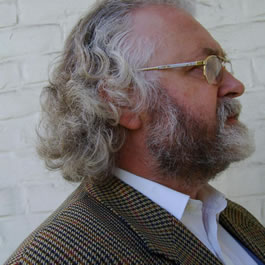
De Hongaarse schrijver en draaiboekauteur Gábor von Vaszary werd geboren op 7 juni 1897 in Boedapest. Zie ook mijn blog van 7 juni 2009.
Uit: Monpti
„Wenn sich eine Frau allein fühlt, kommt sie einfach in einen der kleinen Gärten und setzt sich unter die Bäume, um den Sternenhimmel zu betrachten; sie bleibt nicht lange allein. Aber jetzt ist der Sommer schon vorbei. Die kühlen Herbstabende töten die Liebe und die Fliegen. Auch hier spazieren jetzt prosaische Leute: Arbeiter, Gouvernanten oder Pensionierte. Auch die pharmazeutische Fakultät der Sorbonne liegt hier, Studenten und Studentinnen rennen durch den Park oder setzen sich nieder und blättern in ihren Büchern.
Es ist ein stilles abgeschlossenes Viertel. Auf beiden Seiten starren ständig geschlossene Fenster vornehmer Häuser auf das grüne Laub der zwei Gärtchen. Jedes von beiden hat zwei Alleen. Zwischen den Alleen zieht sich ein blumenumsäumter Rasenstreifen hin, mit einer Statue an jedem Ende. Die Alleen entlang gibt es Bäume und Sessel; man kann sich niederlassen, um ein bißchen Romantik zu riechen unter windbewegtem Laub, oder ziehende Wolken, flatternde Tauben zu betrachten. Auf der einen Seite sieht man vom Jardin du Luxembourg her das Senatsgebäude, auf der andern hebt sich die Kuppel des Observatoire vom grauen Himmel ab.
Hier gehe ich gern spazieren und bilde mir ein, ich sei ein Gutsbesitzer, der, die Hände auf dem Rücken, langsam durch die Alleen schreitet, während die Blätter von den Bäumen rascheln. »Herr Graf, Sie haben tausend Francs verloren.«
»Lassen Sie nur, guter Mann. Man wird sie schon mit den Blättern zusammenkehren.«

Horst Buchholz en Romy Schneider in de verfilming van Monpti uit 1957 door Helmut Käutner
De Duitse dichter, schrijver en cabaretier Fred Endrikat werd geboren op 7 juni 1890 in Nakel an der Netze. Zie ook mijn blog van 7 juni 2009.
Grüsse vom Münchener Odeonsplatz
Gehst du durch den grünen Wald
oder über Alpenmatten –
lieber Schatz, dann merkst du bald:
Wo viel Licht ist, ist viel Schatten.
Stehst du am Odeonsplatz,
fällt dir etwas auf die Jacke –
merkst du gleich, mein lieber Schatz:
Wo viel Tauben, da viel Kacke.
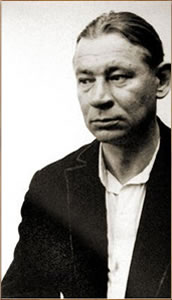
De Engelse schrijfster en egyptologe Amelia Edwards werd geboren op 7 juni 1831 in Londen. Zie ook mijn blog van 7 juni 2009.
Uit: Pharaohs, Fellahs, and Explorers
„Rameses took the field in person with the flower of the Egyptian army, traversing the Land of Canaan, which still remained loyal, and establishing his Syrian headquarters at Shabtu, a fortified town in a small valley a short distance to the south-west of Kadesh. Here he remained stationary for a few days, reconnoitring the surrounding country, and endeavoring, but without success, to learn the whereabouts of the enemy. The latter, meanwhile, had their spies out in all directions, and knew every movement of the Egyptian host. Two of these spies, being previously instructed, allowed themselves to be taken by the King’s scouts. Introduced into the royal presence, they prostrated themseles before Pharaoh, declaring that they were messengers from certain of the Syrian chiefs, their brothers, who desired to break their pact with the Kheta, and to serve the great King of Egypt. They further added that the Khetan host, dreading the approach of the Egyptian army, had retreated to beyond Aleppo, forty leagues to the northward. Rameses, believing their story, then pushed confidently onward, escorted only by his body-guard. The bulk of his horses, consisting of the brigade of Amen, the brigade of Ptah, and the brigade of Ra, followed at some little dis
tance; the brigade of Sutekh, which apparently formed the reserve, lingering far behind on the Amorite frontier.“

Amelia Edwards (Oxlade) en haar man James Oxlade
De Duitse schrijfster Charlotte Niese werd geboren op 7 juni 1854 in Burg auf Fehmarn. Zie ook mijn blog van 7 juni 2009.
Uit: Reifezeit
„Ja, einstmals ist der Teufel über Birneburg dahingefahren und hat den Kirchturm ausreißen wollen. Es ist ihm aber nicht geglückt; nur schief ist das Türmchen geworden und also eine Art Sehenswürdigkeit. Aber der Teufel tat sich weh. Die Hand verrenkte er sich, und in den Eifelwäldern hat es hinterher viel Stöhnen und Geschrei gegeben. Bis der Teufel wieder gesund war und anderswo sein Unheil versuchte.
Glaubst du die Geschichte, Mutterlieb? Harald und ich gingen vom Friedhof zur Stadt hinunter, und ich erzählte ihm vom Teufel. Auch wie er sich doch manchmal wieder nach Birneburg wagte.
Mein Junge macht dann so versonnene Augen und horcht mir zu, als wollte er mir die Worte von den Lippen nehmen.
Es ist eine Sage, Harald. Du weißt, Sagen sind Geschichten, die man nicht gerade zu glauben braucht, die —
Hier stockte ich. Wie ich immer zu tun pflege, wenn meine Rede einen schulmeisterlichen Anstrich erhält. Außerdem weiß ich nicht so recht weiter und freue mich, daß Walter, mein Ehemann, sichtbar wird. Ist er nicht gerade ordentlicher Professor geworden und muß alles wissen? Der Ordinarius hat lange genug auf sich warten lassen. Da war ein alter Vorgänger, der nicht abgehn und auch nicht sterben wollte. Nun hat er sich zu dem ersten entschlossen; und Walter Weinberg ist an seine Stelle getreten.
Also ich überantwortete Harald meinem guten Manne, ließ die beiden zum Gasthaus am Markte gehn und wanderte selbst eine schmale Gasse hinunter, die ich seit mehr als zwanzig Jahren nicht gegangen war. Und ich entsann mich ihrer doch noch so gut, wie ich weinend und in elendem schwarzem Kleide von der Frau Bäckermeisterin in ihr Haus geführt wurde. Mein Vater war meiner Mutter im Tode gefolgt, und ich sollte nicht allein in dem kahlen Zimmer bleiben, in dessen Mitte ein Sarg stand.“

Thomas Mann, Aleksandr Poesjkin, Sarah Dessen, Lesley Blanch, Jean Cayrol
De Duitse schrijver Thomas Mann werd geboren in Lübeck op 6 juni 1875. Zie ook mijn blog van 23 maart 2006, mijn blog van 6 juni 2006, mijn blog van 12 augustus 2006,en mijn blog van 6 juni 2007, mijn blog van 12 augustus 2007, en mijn blog van 6 juni 2008 , mijn blog van 12 augustus 2008 en ook mijn blog van 6 juni 2009 en mijn blog van 12 augustus 2009.
Uit: Herr und Hund
„Wenn die schöne Jahreszeit ihrem Namen Ehre macht und das Tirili der Vögel mich zeitig wecken konnte, weil ich den vorigen Tag zur rechten Stunde beendigte, gehe ich gern schon vor der ersten Mahlzeit und ohne Hut auf eine halbe Stunde ins Freie, in die Allee vorm Hause oder auch in die weiteren Anlagen, um von der jungen Morgenluft einige Züge zu tun und, bevor die Arbeit mich hinnimmt, an den Freuden der reinen Frühe ein wenig teilzuhaben. Auf den Stufen, welche zur Haustüre führen, lasse ich dann einen Pfiff von zwei Tönen hören, Grundton und tiefere Quart, so, wie die Melodie des zweiten Satzes von Schuberts unvollendeter Sinfonie beginnt, – ein Signal, das etwa als die Vertonung eines zweisilbigen Rufnamens gelten kann. Schon im nächsten Augenblick, während ich gegen die Gartenpforte weitergehe, wird in der Ferne, kaum hörbar zuerst, doch rasch sich nähernd und verdeutlichend, ein feines Klingeln laut, wie es entstehen mag, wenn eine Polizeimarke gegen den Metallbeschlag eines Halsbandes schlägt; und wenn ich mich umwende, sehe ich Bauschan in vollem Lauf um die rückwärtige Hausecke biegen und gerade auf mich zustürzen, als plane er, mich über den Haufen zu rennen. Vor Anstrengung schürzt er die Unterlippe ein wenig, so daß zwei, drei seiner unteren Vorderzähne entblößt sind und prächtig weiß in der frühen Sonne blitzen.
Er kommt aus seiner Hütte, die dort hinten unter dem Boden der auf Pfeilern ruhenden Veranda steht, und worin er, bis mein zweisilbiger Pfiff ihn aufs äußerste belebte, nach wechselvoll verbrachter Nacht in kurzem Morgenschlummer gelegen haben mag. Die Hütte ist mit Vorhängen aus derbem Stoff versehen und mit Stroh ausgelegt, woher es kommt, daß ein oder der andere Halm in Bauschans obendrein vom Liegen etwas struppigem Fell haftet oder sogar zwischen seinen Zehen steckt: ein Anblick, der mich jedesmal an den alten Grafen von Moor erinnert, wie ich ihn einst, in einer Aufführung von höchst akkurater Einbildungskraft, dem Hungerturme entsteigen sah, einen Strohhalm zwischen zwei Trikotzehen seiner armen Füße. Unwillkürlich stelle ich mich seitlich gegen den Heranstürmenden, in Abwehrpositur, denn seine Scheinabsicht, mir zwischen die Füße zu stoßen und mich zu Falle zu bringen, hat unfehlbare Täuschungskraft.
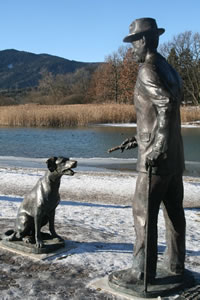
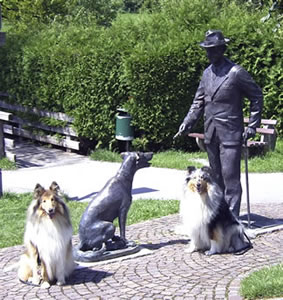
Met Bauschan in brons vereeuwigd in Gmund am Tegernsee
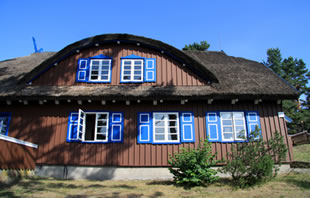
Thomas Manns vakantiehuis in Nida (Litouwen) waar hij in de jaren 1930 – 1932 met zijn gezin vakantie vierde en werkte aan de Joseph tetralogie.
De Russische dichter en schrijver Aleksandr Poesjkin werd geboren in Moskou op 6 juni 1799. Zie ook mijn blog van 6 juni 2007 en ook mijn blog van 6 juni 2008 en ook mijn blog van 6 juni 2009.
Uit: Die Pique-Dame
„Die Pique-Dame bedeutet versteckte Feindseligkeit.
(Neuestes Wahrsagebuch)
Beim Gardeoffizier Narumow fand ein Kartenabend statt. Die lange Winternacht ging ganz unmerklich dahin, und man setzte sich zum Souper erst um fünf Uhr morgens. Diejenigen, die gewonnen hatten, zeigten großen Appetit, die andern saßen zerstreut vor den leeren Tellern. Als der Champagner kam, wurde die Unterhaltung lebhafter, und alle nahmen an ihr teil.
»Nun, wie geht’s, Ssurin?« fragte der Gastgeber. »Schlecht, ich habe alles verloren, wie gewöhnlich. Ich muß gestehen, ich habe immer Pech: ich spiele Mirandole, ruhig, gelassen, lasse mich durch nichts aus der Fassung bringen, und doch verliere ich immer.« »Hast du dich denn nie hinreißen lassen, Route zu setzen? … Ich bewundere deine Selbstbeherrschung!« »Wie gefällt euch der Hermann?« sagte ein Gast, auf einen jungen Genieoffizier zeigend. »Er hat noch nie im Leben eine Karte angerührt, nie gesetzt, und doch bringt er es fertig, mit uns bis fünf Uhr dazusitzen und dem Spiel zuzuschauen.«
»Das Spiel interessiert mich sehr,« sagte Hermann, »ich bin aber nicht in der Lage, das Unentbehrliche auf die Karte zu setzen, um Überflüssiges zu gewinnen.«
»Hermann ist ein Deutscher: er ist sparsam und vernünftig – das ist die Sache!« versetzte Tomskij. »Wen ich aber nicht begreife, das ist meine Großmutter Anna Fjodorowna.«
»Wieso?« riefen die Gäste.
»Ich finde es unbegreiflich,« fuhr Tomskij fort, »warum sie nie pointiert.«
»Es wäre doch weit merkwürdiger, wenn eine achtzigjährige Alte pointieren würde,« bemerkte Narumow.
»Wißt ihr denn gar nichts von ihr?«
»Nein, wirklich nichts.«
»Also hört! Ihr müßt wissen, daß meine Großmutter vor sechzig Jahren in Paris war und dort großen Erfolg hatte. Das ganze Volk lief zusammen, um die ›Venus moscovite‹ zu sehen. Selbst Richelieu machte ihr den Hof, und
meine Großmutter behauptet, er hätte sich ihretwegen beinahe das Leben genommen. Um jene Zeit spielten die Damen noch Pharao.“

Aleksandr Poesjkin (6 juni 1799- 10 februari 1837)
Portret door Vasili Tropinin, 1827
De Amerikaanse schrijfster Sarah Dessen werd geboren op 6 juni 1970 in Evanston, Illinois. Zie ook mijn blog van 6 juni 2009.
Uit: Along for the Ride
„My mother claimed not to be surprised. Ever since the divorce, she’d been predicting it would not be long before my dad, as she put it, “shacked up with some coed.” At twenty-six, Heidi was the same age my mother had been when she had my brother Hollis, followed by me two years later, although they could not be more different. Where my mother was an academic scholar with a smart, sharp wit and a nationwide reputation as an expert on women’s roles in Renaissance literature, Heidi was…well, Heidi. The kind of woman whose strengths were her constant selfmaintenance (pedicures, manicures, hair highlights), knowing everything you never wanted to about hemlines and shoes, and sending entirely too chatty e-mails to people who couldn’t care less.
Their courtship was quick, the implantation (as my mother christened it) happening within a couple of months. Just like that, my father went from what he’d been for years—husband of Dr. Victoria West and author of one well-received novel, now more known for his interdepartmental feuds than his long-in-progress followup— to a new husband and father to be. Add all this to his also-new position as head of the creative writing department at Weymar College, a small school in a beachfront town, and it was like my dad had a whole new life. And even though they were always inviting me to inviting me to come, I wasn’t sure I wanted to find out if there was still a place for me in it.“

Sarah Dessen (Evanston, 6 juni 1970)
De Engelse schrijfster Lesley Blanch werd geboren op 6 juni 1904 in Londen geboren. Zie ook mijn blog van 6 juni 2009.
Uit: The Wilder Shores Of Love
„Everything about her was extraordinary. She was a woman, dressed as a man. A European turned Arab. A Russian who transposed ‘nitchevo’ into ‘mektoub’, whose untidy mystical torments, l’âme slave, found peace in Islam’s faith – and flesh. She was born on the prim, pale lakeside of Geneva. She died on the burning desert. She was an expatriate wanderer whose nomadic Slav background led her to range the desert insatiably: yet she dreamed of a petit-bourgeois haven, a grocer’s shop in some obscure little Algerian town where she and her Arab husband and all his hordes of relatives could conduct a modest business. She adored her insignificant husband, but her sensual adventures were without number. Her behaviour was outrageous: she drank, she smoked hashish, but déclassée, she remained racée. She was the outcast, despised and rejected by French Administration and the colony in general. But she was General Lyautey’s trusted friend. She was a writer who was almost unrecognised, and quite penniless till after her death, when, ironically, posthumous editions of her books earned a small fortune —- for others. Her death was strangest of all, for she was drowned in the desert.
In her brief lifetime Isabelle Eberhardt aroused violent interest. She was loathed or loved, rejected or despised. No one was indifferent to her. Her echoes have never died. No one who knew her ever forgot her. Those who had never known her felt the strange, compelling force of her character. She was a legend during her lifetime.“

De Franse dichter en schrijver Jean Cayrol werd geboren op 6 juni 1911 in Bordeaux. Zie ook mijn blog van 6 juni 2009.
Père Jacques, mon pur feu flambant
Père Jacques, vous me donnez la force d’être à visage ouvert
et je vous trouve sur mon chemin, en pleine gloire.
Mes cheveux blancs ont perdu le vert de mes hivers
et je suis dans vos silences, à jamais sans histoires.
Père Jacques, que je ne sois pas cet enfant misérable,
un errant qui se plaint et ne sait que trahir.
Vous, le tendre invité invisible à ma table
vous faites respirer les cordes de ma lyre.
Père Jacques, mon compagnon du jour, mon trésor
qui me gardez du Mal dont je suis un veilleur.
Par chacun de vos mots si brillants dans votre or
aide-moi à parler de la cendre d’un cœur.
Père Jacques aux mains ouvertes par nos plaies,
je ne deviens plus qu’un seul de vos soupirs.
Vous m’avez ouvert les yeux, vous m’avez donné la Clef.
Ne me laissez pas seul sur un trop vieux navire.
Vous m’êtes l’immortel tremblement de la Paix.

Jean Cayrol (6 juni 1911 – 10 februari 2005)
Zie voor nog meer schrijvers van de 6e juni ook mijn vorige blog van vandaag.
Hendrik van Teylingen, V. C. Andrews, Henry Newbolt, Eliza Orzeszkowa, Annie Fields, Adolf Heyduk, Ignaz Vinzenz Zingerle, Louis Sébastien Mercier, Pierre Corneille
De Nederlandse dichter en vertaler Hendrik van Teylingen werd geboren op 6 juni 1938 in IJmuiden. Zie ook mijn blog van 6 juni 2007 en ook mijn blog van 6 juni 2009.
Kastanjes
Als we de steen mogen geloven
Dan rust jij, Wim, vier lentes net,
Hier haast een halve eeuw al met
Je broertje Joris, dat van boven
Boem! op je buikje werd geschoven
Als veel te groot verjaarspakket –
Geen toetertje deed rettettet,
Geen wimpeltje werd rondgewoven.
Er is sindsdien maar weinig leven
Behalve soms die doffe ploffen
Zo’n zes voet boven jullie bol.
Als jullie samen nu eens even
Naar buiten kwamen, zou je boffen:
Kanstanjes, kerels! ’t Ligt hier vol!
Wanneer ik op mijn sterfbed lig
Wanneer ik op mijn sterfbed lig
(Als ik op bed verscheiden moet),
Het uitgil als een slachthuisbig
En hoest en proest van ’t roetsjend bloed
Raak dan niet in de war alsof
Er iets verschrikkelijks geschiedt
Maar zie het juist als een dikke bof
Dat ik het tranendal ontvlied
Negeer het nare sterflawaai,
Het zwaar gehik en gaar gekrijs,
Galm allemaal een psalm voor mij
En vort ben ik naar ’t paradijs.

Hendrik van Teylingen (6 juni 1938 – 25 december 1998)
Van Teylingen heette ook wel S’rî Hayeshvar Das
De Amerikaanse schrijfster V. C. Andrews (eig. Cleo Virginia Andrews) werd geboren in Portsmouth op 6 juni 1923. Zie ook mijn blog van 6 juni 2009.
Uit: Falling Stars
„Wasn’t this a terrible mistake? Even if the great vote of confidence I had received by being chosen, was I seeking to do something I could never do? Could I live so far away from home and be on my own? I had never spent a single night out of my house. I had never slept in a bed other than my own — no pajama parties with girlfriends, no family trips to stay at hotels, no relatives for me to visit. And yet, here I was, going off to live in a strange place and go to
school with strangers.
A part of me wanted to shout, “Stop driving, Daddy. Turn back. I can’t do this. I won’t do this.”
My tongue actually tried to form the words. Why? Where were my feelings of joy and excitement? I had great reasons to feel that way. the faces of all those envious of me flashed across my eyes. Their covetous words echoed in my ears….
How often had I asked myself, Is my talent a blessing or a curse? How often had I wondered, Where would all of it really take me?
Soon, I would know.“
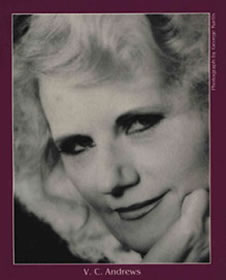
V. C. Andrews (6 juni 1923 – 19 december 1986)
De Engelse dichter en schrijver Sir Henry John Newbolt werd geboren op 6 juni 1862-04.19.1938 in Bilston, Wolverhampton (toen nog gevestigd in Staffordshire, maar nu in de West Midlands) als zoon van de dominee van St Mary’s Church en zijn tweede vrouw. Na de dood van zijn vader, verhuisde het gezin naar Walsall, waar Henry werd zijn opleiding kreeg. Hij kreeg een beurs voor Clifton College, waar hij later hoofd werd van de school (1881) en redacteur van het schoolblad. Van 1887 tot 1899 werkte hij als advocaat. Zijn eerste boek was een roman, Taken from the Enemy (1892), en in 1895 publiceerde hij een tragedie, Mordred, maar het was de publicatie van zijn ballades, Admirals Alle (1897), waarmee hij zijn literaire reputatie vestigde. Verreweg de bekendste daarvan is “Vitai Lampada”.
Vitaï Lampada
There’s a breathless hush in the Close to-night —
Ten to make and the match to win —
A bumping pitch and a blinding light,
An hour to play and the last man in.
And it’s not for the sake of a ribboned coat,
Or the selfish hope of a season’s fame,
But his Captain’s hand on his shoulder smote
“Play up! play up! and play the game!”
The sand of the desert is sodden red, —
Red with the wreck of a square that broke; —
The Gatling’s jammed and the colonel dead,
And the regiment blind with dust and smoke.
The river of death has brimmed his banks,
And England’s far, and Honour a name,
But the voice of schoolboy rallies the ranks,
“Play up! play up! and play the game!”
This is the word that year by year
While in her place the School is set
Every one of her sons must hear,
And none that hears it dare forget.
This they all with a joyful mind
Bear through life like a torch in flame,
And falling fling to the host behind —
“Play up! play up! and play the game!”
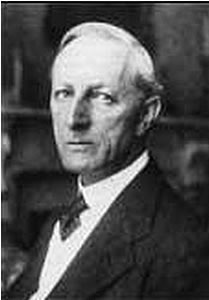
Henry Newbolt (6 juni 1862 – 19 april 1938)
De Poolse schrijfster Eliza Orzeszkowa werd geboren op 6 juni 1842 in Hrodna in het gouvernement Grodno (tegenwoordig Belarus).
Uit: On the Niemen River
“The day was summer and festive. Everything in the world was gleaming, blossoming, radiating fragrance, singing. Warmth and joy were pouring from the azure sky and the golden sun. Happiness and intoxication were spurting out of the fields covered by green corn; happiness and golden latitude were singing by the chorus of birds and insects over the plain in hot air, over small hills, in the bunch of deciduous and coniferous trees covering them. On the one side of the horizon small heels with coppices and groves darkening on them were ascended; across, the high shore of the Niemen, growing out by a sandy wall of the earth’s greenness and cut by the crown of a dark forest from the azure sky, embraced by vast semicircle the extensive and even plain, from which only here and there wild, dumpy pear trees, old, bent willows and lonely, soaring poplars grew out. This day, in the sun, this sandy wall had the semblance of a golden semi-rim, girdled – like by a purple streamer – with the layer of red marl embedded in it”.
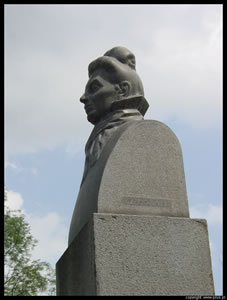
Eliza Orzeszkowa (6 juni 1842 – 18 mei 1910)
Standbeeld in Grodno
De Amerikaanse dichteres en schrijfster Annie Adams Fields werd geboren op 6 juni 1834 in Boston.
Children
WE cannot know the child’s deep heart,
We cannot learn his grief;
Though childhood still is dear to man,
And the spent time so brief.
Who knew the hours of silent joy
In our green garden plot,
Those mornings with the hollyhocks,
Whose beauty fadeth not! —
Days when the hidden steps of spring
Were heard, not understood;
When music from afar swept in,
Born of her dreamful mood, —
Seasons when young Love hid his face
Through joyless, restless days;
The winter of the growing soul,
When summer but delays.
Who knew how sad the darksome path,
The hour of grief how long!
Nor how there came the strong bright day,
And through the mist a song.

Annie Fields (6 juni 1834 – 5 januari 1915)
De Tsjechische dichter Adolf Heyduk werd geboren op 6 juni 1836 in Rychmburk.
Rings ist der Wald so stumm und still
Rings ist der Wald so stumm und still,
das Herz schlägt mir so bange;
der schwarze Rauch sinkt tiefer stets,
die Träne trocknend meiner Wange.
Doch meine Träne trockne nicht,
sollst anders wohin wehen!
Wer auch im Schmerz noch singen kann,
der lebt, nicht wird sein Lied vergehen!

Adolf Heyduk (6 juni 1835 – 6 februari 1923)
De Zuidtiroolse schrijver en germanist Ignaz Vinzenz Zingerle werd geboren op 6 juni 1825 in Meran.
Uit: Berchtlsagen aus Alpach
„In der Gömachtnacht gieng einmal ein Thierbacher Bauer von der Oberau heim. Es warkalt, daß bei jedem Tritt der Schnee unter seinen Füßen krachte, denn der Himmelwar glasheiter. So hell war es in dem Kopf des Bauern aber nicht, er hatte imWirtshaus unten mit lustigen Kameraden ein bislein zu tief in’s Glas geschaut,und weil er nicht selten, statt einen Fuß vor den anderen zu setzen und zwischenden Ohren hindurch der Nase nach fortzugehen, wie der umgehende Schuster dreiSchritte vorwärts und zwei rückwärts tat, so mußte er schon fein oft Athem holen,bis er zur Breitenlechner Rastbank hinauf kam.
Es schlug eben zwölfe und er setzte sich nieder. Da hörte er aus der Ferne reden,viele Stimmen durcheinander; das kam immer näher und näher und gähling zog dieBerchtl mit ihren Kindern gerade neben ihm vorbei. Das kleinste war zu hinterst,denn es hatte ein langes Hemdlein an und trat alleweil darauf, daß es amFürbaßgehen gehindert wurde. Der Bauer hatte Erbarmen, er nahm seinStrumpfband und schürzte ihm das Hemdlein hinauf, dann setzte er sich wiedernieder. Da trat die Berchtl vor ihm hin und sagte ihm voraus, weil er somitleidig und gut gewesen, werden alle seine Nachfolger tüchtig hausen undgenug Zeug und Sach haben. Und wie die Berchtl prophezeit hat, traf es auchein, und noch heutzutage erfreuen sich die Nachkommen jenes Bauern auf demHof “zu Hörbig” eines glücklichen Wohlstandes.“

Ignaz Vinzenz Zingerle (6 juni 1825 – 17 september 1892)
Zie voor de vier bovenstaande schrijvers ook mijn blog van 6 juni 2009.
De Franse schrijver en politicus Louis Sébastien Mercier werd geboren in Parijs op 6 juni 1740. Zie ook mijn blog van 6 juni 2007 en ook mijn blog van 6 juni 2009.
Uit: Tableau de Paris (Martinistes)
„Secte toute nouvelle qui, tournant absolument le dos aux routes ouvertes par la saine physique, par la solide chimie, et faisant divorce avec tout ce que nous dit l’histoire naturelle, s’est précipitée dans un monde invisible qu’elle seule aperçoit. Les martinistes ont adopté les visions du Suéd
ois Swedenborg, qui a vu les anges, qui leur a parlé, qui nous a décrit de sang-froid leur logement, leur écriture, leurs habitudes ; qui a vu enfin de ses yeux les merveilles du ciel et de l’enfer.
Cette secte tire son nom de son chef, auteur du livre intitulé : Des erreurs et de la vérité. Ce livre nous promet, comme tant d’autres, l’évidence et la conviction des vérités, dont la recherche occupe tout l’univers. La base du système est, que l’homme est un être dégradé, puni dans un corps matériel pour des fautes antérieures, mais que le rayon divin qu’il porte en soi peut encore ramener à un état de grandeur, de force et de lumière. Un monde invisible, un monde d’esprits nous environne ; des intelligences douées de diverses qualités vivent auprès de l’homme, sont les compagnons assidus de ses actions, les témoins de ses pensées. L’homme pourrait communiquer avec eux, et étendre par ce commerce la sphère de ses connaissances, si sa méchanceté et ses vices ne lui avaient pas fait perdre cet important secret. Les objets que nous voyons sont autant d’images fantastiques et trompeuses : ce que nous ne voyons pas est la réalité. Les expériences physiques sont des erreurs ; tout est du ressort du monde intellectuel ; il n’y a rien de vrai au-delà : nos sens sont des sources éternelles d’imposture et de folie.“

Louis Sébastien Mercier (6 juni 1740 – 25 april 1814)
De Franse schrijver Pierre Corneille werd geboren in Rouen op 6 juni 1606. Zie ook mijn blog van 6 juni 2007 en ook mijn blog van 6 juni 2008 en ook mijn blog van 6 juni 2009.
Uit: Imitation De Jésus-Christ
” heureux qui tient la route où ma voix le convie,
Les ténèbres jamais n’ approchent qui me suit,
Et partout sur mes pas il trouve un jour sans nuit
Qui porte jusqu’ au coeur la lumière de vie. “
Ainsi Jésus-Christ parle ; ainsi de ses vertus,
Dont brillent les sentiers qu’ il a pour nous battus,
Les rayons toujours vifs montrent comme il faut vivre ;
Et quiconque veut être éclairé pleinement
Doit apprendre de lui que ce n’ est qu’ à le suivre
Que le coeur s’ affranchit de tout aveuglement.
Les doctrines des saints n’ ont rien de comparable
À celle dont lui-même il s’ est fait le miroir :
Elle a mille trésors qui se font bientôt voir,
Quand l’ oeil a pour flambeau son esprit adorable.
Toi qui par l’ amour-propre à toi-même attaché,
L’ écoutes et la lis sans en être touché,
Faute de cet esprit tu n’ y trouves qu’ épines ;
Mais si tu veux l’ entendre et lire avec plaisir,
Conformes-y ta vie, et ses douceurs divines
S’ étaleront en foule à ton heureux desir.
Que te sert de percer les plus secrets abîmes,
Où se cache à nos sens l’ immense trinité,
Si ton intérieur, manque d’ humilité,
Ne lui sauroit offrir d’ agréables victimes ?
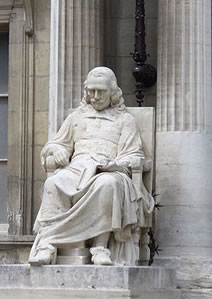
Pierre Corneille (6 juni 1606 – 1 oktober 1684)
Beeld voor het theater op de Place de l’Horloge, Avignon
Federico García Lorca, Adriaan Morriën, Ken Follett, Kristin Gore, Margo Lanagan, Margaret Drabble
De Spaanse dichter en toneelschrijver Federico Garcia Lorca werd geboren op 5 juni 1898 in Fuente Vaqueros, Granada. Zie ook alle tags voor Federico Garcia Lorca op dit blog.
SINT RAFAEL (Córdoba)
Voor Juan Izquierdo Croselles
I
Gesloten koetsen kwamen
aan de oevers vol biezen
waar de golven een naakte
Romeinse torso polijsten.
Koetsen die de Guadalquivir
op zijn rijp kristal
tussen bloemblaadjes
en wolkenklanken spreidt.
De kinderen weven een lied
over wereldse ontgoocheling
bij de oude koetsen
verloren in de nocturne.
Maar Córdoba trilt niet
onder het vage mysterie:
als de schaduw het gebouw
van de rook optrekt,
stut een marmeren voet
zijn kuise en schrale glans.
Bloemblaadjes van slap blik
borduren de zuivergrijze
tinten van de bries als een sprei
over de triomfbogen.
En terwijl de brug
tien Neptunuszuchten slaakt,
vluchten tabakventers
door de vervallen muur.
II
Een enkele vis in het water
dat de twee Córdobas verbindt:
Blank Córdoba van riet.
Córdoba van gebouwen.
Op de oever doen kinderen
onbewogen hun kleren uit,
leerjongens van Tobias
en Merlijnen in hun middel,
ze verstoren de vis
en vragen ironisch
wat hij verkiest: wijnbloemen
of maansikkelsalto’s.
Maar de vis die het water verguldt
en het marmer in rouw dompelt,
leert hen de les en het evenwicht
van een eenzame zuil.
De Aartsengel met donkere
Spaanse en Moorse pailletten,
zocht in de woelige golven
gefluister en bakermat.
Een enkele vis in het water.
Twee Córdobas van schoonheid.
Córdoba gebroken in stralen.
Hemels schraal Córdoba.
Vertaald door Lepus
Weg
Honderd rouwende ruiters,
waarheen gaan ze
door de neergevallen hemel
van de sinaasappelgaard?
Nooit bereiken ze
Cordoba of Sevilla.
En ook Granada niet, dat smacht
naar zee.
Die doezelige paarden
voeren hen mee
naar het labyrint van de kruisen
waar het lied huivert.
Waarheen gaan ze,
met zeven kreten in hun lijf gespijkerd,
de honderd Andalusische ruiters
van de sinaasappelgaard?
Vertaald door Bart Vonck
Gacela der überraschenden Liebe
Niemand begriff den dunklen Magnolien-
duft deines Bauches.
Niemand wußte, daß du zwischen den Zähnen
einen Kolibri der Liebe zu Tode quältest.
Tausend persische Pferdchen schliefen
auf dem Platz im Mondlicht deiner Stirn,
während ich vier Nächte lang deine
Taille, Feindin des Schnees, umschlungen hielt.
Zwischen Gips und Jasmin war dein Blick
ein blasser Zweig mit Samen.
Ich suchte, als Gabe für dich, in meiner Brust
die Elfenbeinbuchstaben, die ewig, ewig,
ewig bedeuten: Garten meiner Qual,
dein Körper für immer flüchtig,
das Blut aus deinen Adern in meinem Mund,
dein Mund schon lichtlos zu meinem Tode.
Vertaald door Johannes Beilharz

Federico García Lorca (5 juni 1898 – 19 augustus 1936), Standbeeld in Madrid
De Nederlandse dichter en schrijver Adriaan Morriën werd geboren op 5 juni 1912 in Amsterdam. Zie ook alle tags voor Adriaan Morriën op dit blog.
Ochtend
De dag ontvangt mij met zijn zichtbaarheid.
De bomen staan in een nadrukkelijk licht.
Ik zie de bladeren afzonderlijk
en tussen hen fragmenten van de lucht.
Ik voel hoe mijn zelfstandigheid verloren gaat
en dat er nauwelijks verschil bestaat
tussen mijn ogen en het licht.
Ars Poetica
De dichter kent geen geheimen
waarover hij iets weet te zeggen
dat niet een woordspeling is,
het tijdverdrijf van zijn regels
Hij kiest uit een taal vol tekens
de tekens die stilte verbreiden:
zijn woord, uit stilte genomen,
keert tot de stilte terug.
Hij oefent zich in het zwijgen,
een tegenstrijdige zanger,
en zingt overstelpt door geluiden
een letterlijk lied aan de stilte.
Afscheid
Zul je voorzichtig zijn?
Ik weet wel dat je maar een boodschap doet
hier om de hoek
en dat je niet gekleed bent voor een lange reis.
Je kus is licht,
je blik gerust
en vredig zijn je hand en voet.
Maar achter deze hoek
een werelddeel,
achter dit ogenblik
een zee van tijd.
Zul je voorzichtig zijn?

De Engelse schrijver Ken Follett werd geboren op 5 juni 1949 in Cardiff, Wales. Zie ook alle tags voor Ken Follett op dit blog.
Uit: The Hammer of Eden
„A man called Priest pulled his cowboy hat down at the front and peered across the flat, dusty desert of South Texas.
The low dull green bushes of thorny mesquite and sagebrush stretched in every direction as far as he could see. In front of him, a ridged and rutted track ten feet wide had been driven through the vegetation. These tracks were called senderos by the Hispanic bulldozer drivers who cut them in brutally straight lines. On one side, at precise fifty-yard intervals, bright pink plastic marker flags fluttered on short wire poles. A truck moved slowly along the sendero.
Priest had to steal the truck.
He had stolen his first vehicle at the age of eleven, a brand-new snow white 1961 Lincoln Continental parked, with the keys in the dash, outside the Roxy Theatre on South Broadway in Los Angeles. Priest, who was called Ricky in those days, could hardly see over the steering wheel. He had been so scared he almost wet himself, but he drove it ten blocks and handed the keys proudly to Jimmy “Pigface” Riley, who gave him five bucks, then took his girl for a drive and crashed the car on the Pacific Coast Highway. That was how Ricky became a member of the Pigface Gang.
But this truck was not just a vehicle.
As he watched, the powerful machinery behind the driver’s cabin slowly lowered a massive steel plate, six feet square, to the ground. There was a pause, then he heard a low-pitched rumble. A cloud of dust rose around the truck as the plate began to pound the earth rhythmically. He felt the ground shake beneath his feet.
This was a seismic vibrator, a machine for sending shock waves through the earth’s crust. Priest had never had much education, except in stealing cars, but he was the smartest person he had ever met, and he understood how the vibrator worked. It was similar to radar and sonar. The shock waves were reflected off features in the earth–such as rock or liquid–and they bounced back to the surface, where they were picked up by listening devices called geophones, or jugs“.
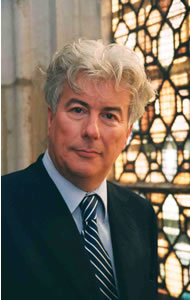
De Amerikaanse schrijfster Kristin Carlson Gore werd geboren op 5 juni 1977 in Carthage, Tennessee Zie ook alle tags voor Kristin Gore op dit blog.
Uit: Sammy’s Hill
„The party really started to rock when Willie Nelson and Queen Nefertiti began pouring shots. I downed one and felt my stomach immediately replaced by a large liquor bonfire that spread through my chest, its flames licking up the inside of my throat. Willie leaned over and whispered that Winnie the Pooh had the hots for me. No way! I loved that guy! As I watched Winnie get down on the dance floor, throwing smoldering Pooh Bear glances in my direction, I all of a sudden felt myself floating. Flapping my arms, I rose higher and higher. Soon I was at thirty thousand feet, and a bit chilly. I plucked the edge of the cloud nearest me and draped it over my shoulders, fashioning a cumulus-nimbus pashmina. Feeling quite stylish, I surveyed the landscape below. I checked in with the mountain ranges, the vast oceans, the tiny cities, the-
“… exceptionally long lines at the gas station. Congressman Francis, do you expect some sort of bailout package for Exxon?”
NPR’s Morning Edition crackled into my consciousness to remind me that I was not a party-hopping sorceress but rather a Capitol Hill staffer who only had twenty minutes to get to work.
Huh. If I didn’t do shots with Willie Nelson and Nefertiti, then why did I feel hungover?A brief glance into the kitchen brought it all back. Right, the bottle of wine from the ninety-nine-cent store. It had seemed like such a good deal at the time.
Okay, twenty minutes. Considering I was supposed to meditate for thirty, I’d have to postpone that until later. I’d also have to delay the fifteen-minute stomach crunch set, the do-it-yourself manicure, and the new dictionary word for the day. I promised myself I’d get to all that, but I knew I was lying. In reality, I would crawl home after working late, feeling too exhausted to do anything but maybe test out some ninety-nine-cent tequila.
But it was way too early in the day for such cynicism. As my dad always said, anything and everything is possible in the morning.
I’d never been a morning person.“

Kristin Gore (Carthage, 5 juni 1977)
De Australische schrijfster Margo Lanagan werd geboren op 5 juni 1960 in Waratah, New South Wales. Veel van haar boeken verschenen alleen in Australië. Een aantal van haar boeken trok echter wereldwijde aandacht. Haar verhalenbundel Black Juice won twee World Fantasy Awards en een 2006 Printz Honor Award. De bundel bevat ook het in veel bloemlezingen opgenomen korte verhaal “Singing My Sister Down.”
Uit: Tender Morsels
„Liga’s father fiddled with the fire, fiddled and fiddled. Then he stood up, very suddenly.
“I will fetch more wood.”
What’s he angry about? Liga wondered. Or worried, or something. He is being very odd.
Snow-light rushed in, chilling the house. Then he clamped the door closed and it was cozy again, cozy and empty of him. Liga took a deep private breath then blew it out, slowly. Just these few moments would be her own.
But her next breath caught rough in her throat. She opened her eyes. Gray smoke was cauliflowering out of the fireplace, fogging the air. The smell! What unnamable rubbish had fallen in the fire?
She coughed so hard she must put aside the rush mat she was binding the edge of and give her whole body over to the coughing. Then pain caught her, low, and folded her just like a rush-stalk, it felt, in a line across her belly, crushing her innards. She could hardly get breath to cough. Sparks that were not from the fire jiggled and swam in her eyes—she could not see the fire for the smoke. She could not believe what she was feeling.
The pain eased just as abruptly. It let her get up. It gave her a moment to stagger to the door and open it, her insides dangerous, liquid, hot with surprise and readying to spasm again.
Her father was halfway back from the woodpile, his arms full. He bared his teeth at her, no less. “What you doing out?” White puffs came with the words. “Get back inside. Who said you could come out?”
“I cannot breathe in there.” The cold air dived down her throat and she coughed again.
“Then go in and don’t breathe! Shut the door—you’re letting the smoke out. You’re letting the heat.” He dropped the wood in the snow.“
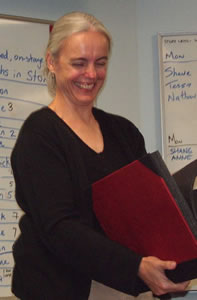
Margo Lanagan (Waratah, 5 juni 1960)
De Engelse schrijfster Margaret Drabble werd geboren op 5 juni 1939 in Sheffield, Yorkshire. Zie ook alle tags voor Margaret Drabble op dit blog.
Uit: The Pattern in the Carpet
„I had recently finished a novel, which I intended to be my last, in which I believed myself to have achieved a state of calm and equilibrium. I was pleased with The Sea Lady and at peace with the world. It had been well understood by those whose judgement I most value, and I had said what I wanted to say. I liked the idea of writing something that would take me away from fiction into a primary world of facts and pictures, and I envisaged a brightly coloured illustrated book, glinting temptingly from the shelves of gallery and museum shops amongst the greetings cards, mugs and calendars portraying images from Van Gogh and Monet. It would make a pleasing Christmas present, packed with gems of esoteric information that I would gather, magpie-like, from libraries and toy museums and conversations with strangers. I would become a jigsaw expert. It would fill my time pleasantly, inoffensively. I didn’t think anyone had done it before. I would write a harmless little book that, unlike two of my later novels, would not upset or annoy anybody.
It didn’t work out like that.
Not long after I conceived of this project, my husband Michael Holroyd was diagnosed with an advanced form of cancer and we entered a regime of radiotherapy and chemotherapy all too familiar to many of our age. He endured two major operations of hitherto unimagined horror, and our way of life changed. He dealt with this with his usual appearance of detachment and stoicism, but as the months went by I felt myself sinking deep into the paranoia and depression from which I thought I had at last, with the help of the sea lady, emerged. I was at the mercy of ill thoughts.
Some of my usual resources for outwitting them, such as taking long solitary walks in the country, were not easily available. I couldn’t concentrate much on reading, and television bored me, though DVDs, rented from a film club recommended by my sister Helen, were a help. We were more or less housebound, as we were told to avoid public places because Michael’s immune system was weak, and I was afraid of poisoning him, for he was restricted to an unlikely diet consisting largely of white fish, white bread and mashed potato.
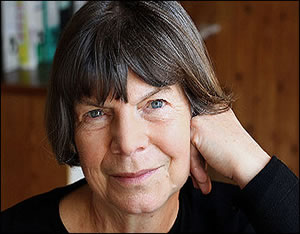
Margaret Drabble (Sheffield, 5 juni 1939)
Zie voor nog meer schrijvers van de 5e juni ook mijn vorige blog van vandaag.
Thomas Kling, Carel Peeters, Hélène Cixous, Spalding Gray, Christy Brown, David Hare, Otto F. Walter, Ivy Compton-Burnett, Alifa Rifaat
De Duitse dichter en schrijver Thomas Kling werd geboren op 5 juni 1957 in Bingen. Zie ook alle tags voor Thomas Kling op dit blog.
Kriegsbeginn: Actaeon 1, Nach Pound
(für Ute Langanky)
Ein bild der Lethe,
und den feldern
Voll stumpfen lichts,
doch golden,
Graue kliffs,
und unter ihnen
Ein meer
Strenger als granit,
unruhig, niemals aufgebend;
Hohe gestalten
mit den gesten von göttern,
Gefährliche aussichten;
Und einer sagte:
»Das ist Actaeon.«
Actaeon mit den beinschienen von gold!
Über helle wiesen,
Übers überlegene gesicht dieses felds,
Unruhig, immer in bewegung,
Heere eines antiken volks,
Das stumme gefolge.
Actaeon 2
(für Mauritius Wenner)
so wird die akte Actaeons geschlossen. an einem fluß.
ein schlechtgetarnter und ertappter voyeur, der haar
und haut der badenden genau betrachtet hat. ihr pfiff:
schon springen Actaeon die eigenen hunde an, die haben
ihn sofort an hals und gurgel. es geht dann alles superschnell:
die linse eingespritzt, nicht nur mit speichel. hundegeifer
hat im nu dem seinen körper überzogen. gebisse, risse
gehen durch den Actaeon; die beinah stumme männer-
gurgel. so ohne körper, ohne strom; dabei beguckt: der
löst, als hirschenschrei, sich auf: die blicktransfusionen,
die nichts nützen können; kann, mit neuen, lauten augen,
Actaeon sehen die augen der frau? schweigsame augen.
ohne lust. es mag die meute ihren Actaeon! wie sie sein
hirschfleisch lieben, seine augenkamera! und hören nicht
auf ihre namen so wird die akte Actaeon geschlossen.
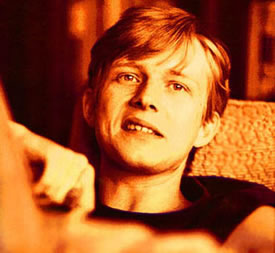
Thomas Kling (5 juni 1957 – 1 april 2005)
De Nederlandse literair criticus Carel Peeters werd geboren in Nijmegen op 5 juni 1944. Zie ook alle tags voor Carel Peeters op dit blog.
Uit: De jaloezie van de tijd. A.F.TH. van der Heijden
„Het is met De tandeloze tijd als met die andere ambitieuze cycli, Prousts A la Recherche du Temps Perdu en La Comédie Humaine van Balzac: het zijn alle drie zulke ruime titels dat er meerdere delen in kunnen zwemmen. De tandeloze tijd is van de drie misschien wel het minst eenduidig en het suggestiefst, op zoveel manieren blijkt hij te kunnen worden uitgelegd. De eerste associatie bij zo’n titel is de voor de hand liggendste. Wat bij De tandeloze tijd verschijnt is het laatste kwart van de twintigste eeuw, onze eigen tijd, gebed in het dons van welvaart en verzorging. Zo’n eerste associatie is veelzeggend: blijkbaar is er maar al te zeer reden voor en er zijn kennelijk genoeg verschijnselen die deze tijd tandeloos maken. Maar associaties kunnen bedrieglijk zijn, het zijn niet zelden alleen maar luie impressies. Al komen ze nooit helemaal uit de lucht vallen, ze zijn soms gemakzuchtig en gauw tevreden. In het geval van De tandeloze tijd gaat het bij die eerste associatie om een soort poëzie die van bepaalde slagwoorden (verzorgingsstaat, welvaartsstaat, restauratie, post-modern relativisme) een goedklinkende som maakt (‘een tandeloze tijd’). Zoveel poëzie is alleen mogelijk wanneer andere verschijnselen worden weggedrukt die wel degelijk in het bezit zijn van tanden (ongebreidelde verzakelijking, profijtbeginsel, carrièrezucht, yuppiedom, patserig individualisme).
De titel van Van der Heijdens romancyclus is een vrijmoedige interpretatie. Het bevat een vruchtbare spanning die gedachten in beweging kan zetten, zodat de vraag kan opkomen: is dat van die tandeloosheid wel helemaal zo? Wanneer de periodiek drankzuchtige advocaat Quispel in Advocaat van de hanen zegt dat de wereld haar smaak heeft verloren, en dat niets ‘restte om nog de tanden in te zetten’ dan is de vraag of we hier niet te maken hebben met zijn geblaseerdheid en tandeloosheid, en niet van de tijd waarin hij leeft.“

Carel Peeters (Nijmegen, 5 juni 1944)
De Franse feministische schrijfster, dichteres, professor, filosoof, literair criticus en historica Hélène Cixous werd geboren in Oran, Algerije, op 5 juni 1937. Ze heeft een Duitse, Asjkenazisch-Joodse moeder en een Algerijns, Sefardisch-Joodse vader. In 1957 kreeg ze haar agrégation in Engels en 1968 werd ze doctorandus in de letterkunde. Zij richtte zich toen vooral op Engelse literatuur en de werken van James Joyce. In 1969 publiceerde Cixous L’Exil de James Joyce ou l’Art du remplacement, het jaar daarop Dedans, een gedeeltelijk autobiografische roman. Cixous kreeg voor Dedans de Prix Médicis. Zij publiceerde veel, waaronder drieëntwintig gedichtbundels, zes essays, vijf toneelstukken en veel invloedrijke artikelen. Samen met Luce Irigaray en Julia Kristeva, wordt Hélène Cixous gezien als een van de moeders van de poststructuralistische feministische theorie. Sinds de jaren 90, hebben ze samen grote invloed gehad op het Franse feminisme en de feministische psychoanalyse. In 1975 publiceerde Cixous haar meest invloedrijke artikel: Le rire de la Meduse.
Uit: Voiles
„La myopie était sa faute, sa laisse, son voile natal imperceptible. Chose étrange, elle voyait qu’elle ne voyait pas, mais elle ne voyait pas bien. Chaque jour il y avait refus, mais qui pouvait dire d’où partait le refus : qui se refusait, était-ce le monde ou elle ? Elle était de cette race obscure subreptice qui va désemparée devant le grand tableau du monde, toute la journée en posture d’aveu : je ne vois pas le nom de la rue, je ne vois pas le visage, je ne vois pas la porte, je ne vois pas venir et c’est moi qui ne vois pas ce que je devrais voir. Elle avait des yeux et elle était aveugle.
Elle devait passer tous les jours au large du château. L’aide venait de la statue de Jeanne d’Arc. La grande femme en or brandissait sa lance flamboyante et lui montrait la direction du château. En suivant l’indication d’or elle finissait par y arriver. Jusqu’au jour où. Un matin sur la place il n’y avait rien. La statue n’était pas là. Il n’y avait pas trace de château. À la place du saint cheval une pénombre mondiale. Tout était perdu. Chaque pas augmenterait l’égarement. Elle resta pétrifiée, privée de l’aide de sa statue. Elle se vit arrêtée au sein de l’invisible. De toutes parts elle voyait ce rien pâle sans limites, c’était comme si par un faux pas elle était entrée vivante chez la mort. L’ici néant durait, et personne. Elle saisie, tombée debout dans l’étendue insondable d’un voile, et voilà tout ce qui restait de la ville et du temps. La catastrophe s’était produite en silence.
Et maintenant qui était-elle ? Seule. Un petit clou de travers dans l’intervalle.
Plus tard dans l’intervalle quelqu’un abruptement surgi du rien lui affirma que les choses n’avaient pas fui du tout. Elles étaient à leur place assurément. Ainsi c’était elle qui ne voyait pas la statue ni le château ni les rebords du monde ni l’autobus ? Une voilette de brume avait eu raison des existences à ses pauvres yeux crédules. La grande statue d’or n’avait pas résisté. Ce fut sa première apocalypse. La ville perdit de sa solidité.“

Hélène Cixous (Oran, 5 juni 1937)
De Amerikaanse schrijver en acteur Spalding Gray werd geboren op 5 juni 1941 in Barrington, Rhode Island. Zie ook alle tags voor Spalding Gray op dit blog.
Uit: Life Interrupted
„We were invited to the Scanlon estate. John Scanlon was a publicist, a very big one, in all senses of the word. He was a publicist for Bill Clinton, actually, during the Monica Lewinsky scandal, and he had this huge house in Ireland that he was inviting a group of us over to for this birthday bash. He was a big gourmand, and he perished in front of the TV after a big meal just two weeks before we were supposed to go, just died. His wife said, “Come on over anyway, John would have loved it.”
So over we went, in spite of his death, about twelve of us, five children — my niece, my stepdaughter, and my two sons, and Tara Newman’s son — and the rest adults, and the house was big enough to accommodate that without any confusion. I have to say that this place, exquisite stone manor that it was, reminded me a little bit of The Shining. It was disconcerting, actually. It was set right in the middle of these woods and fields, and the kids went running in the fields with no fear of deer ticks for the first time in a long time. The woods looked like Harry Potter woods; they were very old, it was about twelve acres of land, and all very spooky. It was in the town of Mort, which was even more of a spooky name, in the county of Offaly. O-f-f-a-l-y.
We arrived on the longest day of the year, June 21, 2001, and all went to celebrate with a treasure hunt. In the morning, the following day, the next-longest day of the year, Barbara Leary was down in the kitchen — Barbara Leary was the ex-wife of Timothy Leary and she was one of the guests there — and I was talking with her and she said that she’d dreamt that I’d done a new monologue, and I said, “No, there’s nothing on the table, really, nothing new. My life is without crisis and usually they’re based on crisis, and I don’t have anything planned at all. Things are going smoothly.”

Spalding Gray (5 juni 1941 – 10 januari 2004)
De Ierse dichter, schrijver en schilder Christy Brown werd geboren op 5 juni 1932 in Dublin. Zie ook alle tags voor Christy Brown op dit blog.
What Her absence Means
It means
no madcap delight will intrude
into the calm flow of my working hours
no ecstatic errors perple
my literary pretensions.
It means
there will be time enough for thought
undistracted by brown peril of eye
and measured litany of routine deeds
undone by the ghost of a scent.
It means
my neglect of the Sonnets will cease
and Homer come into battle once more.
I might even find turgid old Tennyson
less of a dead loss now.
It means
there will be whole days to spare
for things important to a man –
like learning to live without a woman
without altogether losing one’s mind.
It means
there is no one now to read my latest poem
with veiled unhurried eyes
putting my nerves on the feline rack
in silence sheer she-devil hell for me.
It means
there is no silly woman to tell me
‘Take it easy – lie’s long anyway –
don’t drink too much – get plenty of sleep -‘ and other tremendous cliches.
It means
I am less interrupted now with love.

Christy Brown (5 juni 1932 – 6 september 1981)
De Britse schrijver, dramaturg en regisseur David Hare werd geboren op 5 juni 1947 in Sussex. Zie ook alle tags voor David Hare op dit blog.
Uit: David Hare’s ‘Stuff Happens’: All the President’s Men in ‘On the Road to Baghdad’
(Bespreking door Ben Brantley in de New York Times, 14 april 2006)
„CONTRARY to what the American politicians of David Hare’s “Stuff Happens” might believe, bigger doesn’t always mean more powerful. The Public Theater’s invigorating new production of Mr. Hare’s journalistic drama about the road to war in Iraq, first mounted with epic proportions at the National Theater in London in 2004, is here conducted on the modest scale of a town-hall meeting. It is as if a telescope, first set up to be looked through at the wrong end, were now righted, changing not composition but perspective.
The characters, who include the sitting American president and British prime minister and many of their cabinet members, feel closer to the audience — not just physically but emotionally. Often, they seem less like destiny-shaping, arbitrary gods than like the ego-trippers in your office. If that means they are too close for comfort, then “Stuff Happens,” which opened last night under the smart, sharp direction of Daniel Sullivan, is doing its job.
Shrinkage may be the best thing that could have happened to Mr. Hare’s quasi-documentary play. When I saw it in London, on the immense stage of the Olivier auditorium at the National, directed by Nicholas Hytner, the play had the marmoreal quality of mythic events carved into a temple frieze.“

David Hare (Sussex, 5 juni 1947)
De Zwitserse schrijver en uitgever Otto Friedrich Walter werd geboren op 5 juni 1928 in Rickenbach.
Uit: Wie wird Beton zu Gras? — Fast eine Liebesgeschichte
(Bespreking door W. Martin Lüdke in Zeit- Online, 24 augustus 1979)
„Nicht mehr Studenten sind es, Randgruppen, im bürgerlichen Sinn „Ausgefiippte”, die am Rande der Stadt (wie in der „Verwilderung”) und in den Randbereichen der Gesellschaft ohnehin, versuchen, neue, andere Lebensformen zu entwickeln, die es ihnen erlauben, auf eine humane Weise miteinander umzugehen. Zwar geht es auch in dieser Erzählung wieder um das „Neue” und um das „Mögliche” — gegen die etablierten Verhältnisse. Zwar ist auch hier wieder etwas von der Zartheit und Diskretion zu spüren, mit der Walter erzählen kann, und von der Sinnlichkeit auch. „Koni schaffte zum Lautsprecherwagen mitten auf der Parkwiese-^ Eben noch habe Nik dort gestanden. Koni ging dann weiter. Er kickte mit dem rechten Fuß einen leeren Papierbecher hinter seinem linken Absatz zur Seite. Esther mußte ein wenig lathen, als er plötzlich, schon zwölf Meter von ihr entfernt, den Handstand machte, ein bißchen auf den Händen weiterging” — hier kommt etwas von der fröhlichen Tollkühnheit durch, mit der die beiden am Ende ihren Panzer, Konis Panzer, durch die Stadt fahren, von der Tollkühnheit, mit der einmal die Macht der Phantasie gefordert wurde.
Die fast noch kindliche Unbeschwertheit der beiden Geschwister, die eher zufällig in die Demonstration geraten sind, ahnen allenfalls, worum es geht, und sind doch fasziniert von der Lebensweise, den Möglichkeiten des miteinander Umgehen s, die sie dabei erfahren, diese Unbekümmertheit läßt sie klare Alternativen erkennen, obwohl sie nur dumpf in sich spüren, wie da etwas ihren eigenen Bedürfnissen und Interessen, ihren Gefühlen entgegenkommt, was in der Welt, in der sie leben, ,.dem Alten”, keinen Platz hat. Ihre kindliche Zuversicht wird freilich, man muß sagen: in einem Lernprozeß auf eine harte Probe gestellt. Was „am 2. Juni in den Parkanlagen hinter der Friedenskirche in Ölten” beginnt, eine große Schweizer Demonstration gegen den Bau von Kernkraftwerken, hat Folgen.“

Otto F. Walter (5 juni 1928 – 24 september 1994)
De Engelse schrijfster Ivy Compton-Burnett werd geboren op 5 juni 1884.
Uit: Schwarze Utopie (Bespreking van Männer und Frauen in Der Spiegel)
„Sie reden fernab jeder Kindlichkeit: raffinierte Dialektiker, die wie Winkeladvokaten ihrer selbst argumentieren, um sich im Legitimationslabyrinth der Konversation zurechtzufinden. “Bist du taub?” beschimpft Horace seine älteste Tochter. “Wenn du jemanden taub nennst”, antwortet ein Sohn, “kannst du nicht von ihm erwarten, daß er hört: Dann kannst du ihm auch keinen Vorwurf machen.”
Etwas sanfter, dafür aber um so hinterhältiger wirkt die Gewalt der Konversations-Konventionen in dem früheren Roman “Männer und Frauen”. Hier wird eine Familie vorgeführt, die unter dem tyrannischen Diktat einer kränkelnden Mutter steht. Die versucht eines Tages, sich umzubringen; der Selbstmord mißlingt, dafür verfällt sie dem Wahnsinn und muß längere Zeit in einer Heilanstalt verbringen.
Gesund taucht sie dann wieder auf, um sich aufs neue störend in alles einzumischen. Dem setzt der älteste Sohn ein Ende, indem er seine Mutter vergiftet, ein Mord, der mit Erfolg vertuscht werden kann. Sir Godfrey, der Vater, träumt schon von einer neuen Ehe (mit einer Ehemaligen seines Sohnes), muß aber bei der Eröffnung des Testaments erfahren, daß er durch eine zweite Heirat seine Einkünfte verliert. Über diese unerwartete Rache seiner Frau ist er zunächst schockiert, aber nur für einen Moment. Denn sofort und fast automatisch beginnt er mit Umdeutungsübungen, die die Ereignisse und Gefühle wieder zurechtlegen sollen:
“Für mich ist es zu Ende mit den guten Dingen des Lebens. So ist es nur recht und billig, das gebe ich zu. Vermutlich dachte meine Frau, es sei mein innigster Wunsch, in der Vergangenheit zu leben. Sie wollte ihren Gatten behalten. Und das freut mich. Ich fühle mich erhoben und geschmeichelt. Was in meiner lieben Harriet vorgegangen ist, verstehe ich so gut, als hätte ich es mir selbst erklärt. Ja, ich kann sagen, sie hat es mir erklärt, nur daß ich kein Gedächtnis für solche Dinge habe.”

Ivy Compton-Burnett (5 juni 1884 – 27 augustus 1969)
Zie voor alle bovenstaande schrijvers ook mijn blog van 5 juni 2009.
De Egyptische schrijfster Alifa Rifaat werd op 5 juni 1930 in Caïro geboren. Zie voor onderstaande schrijfster ook mijn blog van 5 juni 2007.
Uit: Distant View of a Minaret and Other Stories
„In an instant between sleep and wakefulness, an instant outside the bounds of time, that gave the sensation of being eternal, the sounds of night, like slippery fishes passing through the mesh of a net, registered themselves on Zennouba’s hearing, filtering gradually into her awakening consciousness: the machine like croaking of frogs and the barking of dogs in the fields answered by the dogs of the village on the other bank in a never-ending exchange of information in some code language“.

Alifa Rifaat (5 juni 1930 – ? 1996)
Caïro, Citadel (geen portret beschikbaar)
Buddy Wakefield, Marie Ndiaye, Ralf Thenior, Erasmus Schöfer, Yaak Karsunke, Apollon Maykov, Jacques Roumain, Elizabeth Jolley, Charles Dickinson, Dana Bönisch, Fritz Weber
De Amerikaanse (slam) dichter Buddy Wakefield werd geboren op 4 juni 1974 in Shreveport, Louisiana. Zie ook mijn blog van 4 juni 2009.
WE WERE EMERGENCIES
A poet
can stick anything into the fog and make it look like a ghost.
But tonight let us not become tragedies.
We are not funeral homes
with propane tanks in our windows
lookin’ like cemeteries.
Cemeteries are just the Earth’s way of not letting go.
Let go.
Tonight, Poets, let’s turn our wrists so far backwards
the razor blades in our pencil tips
can’t get a good angle on all that beauty inside.
Step into this
with your airplane parts
and repeat after me with your heart:
I no longer need you to fuck me as hard as I hate myself.
Make love to me
like you know I am better than the worst thing I ever did.
Go slow.
I’m new to this
but I have seen nearly every city from a rooftop without jumping.
I have realized the moon did not have to be full for us to love it.
We are not tragedies
stranded here beneath it.
If my heart really broke every time I fell from love
I’d be able to offer you confetti by now
but hearts don’t break, y’all,
they bruise and get better.
We were never tragedies.
We were emergencies.
You call 9 – 1 – 1.
Tell them I’m havin’ a fantastic time.

Buddy Wakefield (Shreveport, 4 juni 1974)
De Franse schrijfster Marie Ndiaye werd geboren op 4 juni 1967 in Pithiviers. Zie ook mijn blog van 4 juni 2009.
Uit: Trois Femmes puissantes
„Et celui qui l’accueillit ou qui parut comme fortuitement sur le seuil de sa grande maison de béton, dans une intensité de lumière soudain si forte que son corps vêtu de clair paraissait la produire et la répandre lui-même, cet homme qui se tenait là, petit, alourdi, diffusant un éclat blanc comme une ampoule au néon, cet homme surgi au seuil de sa maison démesurée n’avait plus rien, se dit aussitôt
Norah, de sa superbe, de sa stature, de sa jeunesse auparavant si mystérieusement constante qu’elle semblait impérissable.
Il gardait les mains croisées sur son ventre et la tête inclinée sur le côté, et cette tête était grise et ce ventre saillant et mou sous la chemise blanche, au-dessus de la ceinture du pantalon crème.
Il était là, nimbé
de brillance froide, tombé sans doute sur le seuil de sa maison arrogante depuis la branche de quelque flamboyant dont le jardin était planté car, se dit Norah, elle s’était approchée de la maison en fixant du regard la porte d’entrée à travers la grille et ne l’avait pas vue s’ouvrir pour livrer passage à son père — et voilà que, pourtant, il lui était apparu dans le jour finissant, cet homme irradiant et déchu dont un monstrueux coup de masse sur le crâne semblait avoir ravalé les proportions harmonieuses que Norah se rappelait à celles d’un gros homme sans cou, aux jambes lourdes et brèves. Immobile il la regardait s’avancer et rien dans son regard hésitant, un peu perdu, ne révélait qu’il attendait sa venue ni qu’il lui avait demandé, l’avait instamment priée (pour autant, songeait-elle, qu’un tel homme fût capable d’implorer un quelconque secours) de lui rendre visite.“

Marie Ndiaye (Pithiviers, 4 juni 1967)
De Duitse dichter en schrijver Ralf Thenior werd geboren op 4 juni 1945 in Bad Kudowa.
Nur Bahnhof
Am Himmel steht
der große Bahnhof
neben dem kleinen Bahnhof.
Beide hell erleuchtet.
Ein roter Läufer.
Ein schwarzer Läufer.
Was zögerst du,
faules lyrisches Ich?
Welchen willst du wählen,
um in dieses Gedicht zu gehn?
Der rote Läufer
hat Schnupfen.
Er heißt übrigens Akim.
Der schwarze Läufer
findet diesen Namen scheiße.
Er ist ein »von«, genauer gesagt:
Olaf von Schwarze-Läuffer.
Ach, du Schande!
Jetzt hauen beide
in verschiedene Richtungen ab.
Die Bakkaluten
Die Bakkaluten sind schlapp und matschig.
Sie lesen kaum.
Sie beobachten sich ständig gegenseitig,
und wenn ein Bakkalute irgendetwas tut,
tun es ihm alle nach.
Einmal hat einer „O sole mio“ gesungen.
Es war ein grässliches Gekrächze.
Die Bakkaluten singen kaum.
Sie denken auch kaum.
Aber wenn ein Bakkalute doch einmal denkt,
.

Ralf Thenior (Bad Kudowa, 4 juni 1945)
De Duitse schrijver Erasmus Schöfer werd geboren op 4 juni 1931 in Altlandsberg bij Berlijn.
Uit: Winterdämmerung
“Der schmale Buchhändler stand etwas steif, sichtlich unsicher, neben dem niedrigen Podest, auf dem saß ein alter Mann an dem quadratischen Tisch mit Wasserglas und Leselampe, der mal zu ihm, mal in das Publikum schaute, das die wenigen Stuhlreihen in der kleinen Buchhandlung lückenlos besetzt hatte. Aufmerksam, neugierig, hörte der Weißhaarige seiner Begrüßung zu, lächelnd, als ihm zu seinem fünfundsiebzigsten Geburtstag und seiner dennoch rastlosen Tätigkeit für eine lebbare Zukunft gratuliert wurde. Auch dafür gedankt, dass ihm, der zum Beispiel auf der Bonner Hofgartenwiese gegen die Raketenrüstung gesprochen hatte – er selbst einer der Hunderttausende Zuhörer – ein Abend seines Lebens für dieses notwendig begrenzte Publikum des BiBaBuZe nicht zu schade sei.
Versichern konnte ihm der Buchhändler, dass dieser fast versteckte Ort für die Düsseldorfer Linken, durch die hier täglich geführten Gespräche und die bereit gehaltenen Bücher und Zeitschriften, eine jener Zukunftswerkstätten, jener ins Offene gerichteten DenkStätten sei, die einzurichten er seit Jahren empfehle, als basisdemokratische Medizin gegen die versteinerten Verhältnisse in der herrschenden Politik und Wissenschaft. Grade für sie im Rheinland komme sein eben erschienenes Buch mit dem Titel Projekt Ermutigung und dem Untertitel Streitschrift wider die Resignation wie gerufen, da alle hier noch unter dem Schockerlebnis der Niederlage in dem Kampf stünden, den die, es müsse erlaubt sein zu sagen: heldenhafte Belegschaft des Rheinhauser Kruppstahlwerks, unter aktiver Mitwirkung großer Teile des Proletariats im Ruhrgebiet, ein halbes Jahr lang um den Erhalt ihrer Hütte geführt hat. Darf ich Sie nun direkt fragen, Herr Jungk – gehören Sie zu jener selten gewordnen Sorte Menschen, die man Optimisten nennt?”

Erasmus Schöfer (Altlandsberg, 4 juni 1931)
De Duitse dichter en schrijver Yaak Karsunke werd geboren op 4 juni 1934 in Berlijn.
Uit: Ein Gedicht in einem Gewerkschaftshaus schreiben
“Von 1983 bis 1985 hatte ich das Vergnügen, dem kulturpädagogischen Beirat des DGB- Jugendprojekts „Jugendkulturarbeit” anzugehören (selbstverständlich: ehrenamtlich). Mitarbeiter des Projekts begleiteten drei Jahre lang die Arbeit mehrerer Kulturgruppen der Getwerkschaftsjur gend, die sich durchaus nicht alle mit dem Alismalen vorgegebener Schablonen zufrieden gaben. Im Abschlußbericht schrieb Michael Bauer über eine von ihm betreute Gruppe von Bergmechaniker-Lehrlingen: „Nur Reden und Theoretisieren liegt den Jugendlichen sehr fern. Wenn überhaupt, war Reflexion eher über den Weg der Verwunderung zu erreichen. Verwunderung, die bei der Anschauung des bereits Produzierten ausgelöst wurde: ,Was haben wir da fabriziert’? Was kann das bedeuten? Wie arbeiten wir weiter?'”
Der Weg der Verwunderung ist (hoffentlich) jedem Schriftsteller aus der eigenen Arbeit vertraut. Er führt auf manchmal spielerische, manchmal abenteuerliche Weise zu neuen Erkenntnissen, auch Selbsterkenntnissen – und damit auch zu mehr Selbs>Bewußtsein. Auf selbstbewußte und selbständige Mitglieder reagiert allerdings der Gewerkschaftsapparat – wie der jeder Großorganisation – mit Mißtrauen und verstärkter Kontrolle; in fast allen gewerkschaftlichen Kulturdebatten schwingt die Angst davor mit, die kulturelle Betätigung von Mitgliedern könne sich „verselbständigen” beziehungsweise „zum Selbstzweck werden”, indem sie andere als von der Organisation erlaubte Themen behandelt (im schlimmsten Fall: von der Organisation tabuierte oder lieber verschwiegene). Bekanntlich macht Einigkeit stark, also soll niemand aus der Reihe tanzen.”
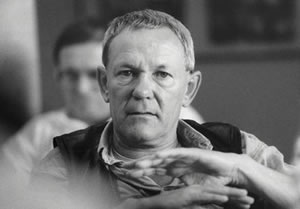
Yaak Karsunke (Berlijn, 4 juni 1934)
De Russische dichter Apollon Nikolayevich Maykov werd geboren op 4 juni 1821 in Moskou.
It’s impossible!
It’s impossible! It’s impossible!
She’s alive!… she will wake up in a moment…
Look: she wants to speak,
She will open her eyes, smiling,
and when she sees me, she will understand
What my disconsolate crying is about;
And suddenly will whisper with a smile:
“Why, I’m alive! What is he crying about!”
But no! she is lying… so quiet, mute, motionless….
Vertaald door Yuri Mitelman

Apollon Maykov (4 juni 1821 – 20 maart 1897)
De Haïtiaanse dichter, schrijver en politicus Jacques Roumain werd geboren op 4 juni 1907 in Port-au-Prince
Pour célébrer la terre (Fragment)
Verte et fraîche
hors de la nuit
Arrachée verte et fraîche
à la nuit
Pour célébrer la terre
hors du lit de la nuit
où dormait la nuit
molle et douce dans chaque creux de la terre
La nuit comblait chaque creux de la terre
coulant jusqu’au profond de chaque ravin
le long de toutes pentes
Et chaque pente surélevée
chaque doux mamelon de colline
toutes les montagnes brandies le jour comme un cri
chaque pente chaque montagne
étaient enveloppées par la nuit
enveloppées par la nuit
prises dans la pesanteur mouillée
des bras de la nuit
la terre entière
dans ses creux
dans ses collines
enveloppée dans la pesanteur mouillée de la nuit
Pour célébrer la terre hors de la nuit
verte et fraîche
mille rayons clairs debout
derrière d’autres mornes
jusqu’à d’autres rayons clairs
derrière d’autres mornes
mille rayons clairs
de mornes à mornes
dentelés
dans les rayons clairs
mille par mille rayons clairs
font une tente de clarté
au-dessus des creux profonds
arrachés à la nuit
au-dessus des creux profonds
hors de la nuit
au-dessus des creux
entre les mornes
crêtés de rayons clairs
hors du creux profond de la nuit
hors du creux noir et mouillé de la nuit
dans un creux profond des mornes
dans un creux
entre mornes crêtés et rayons clairs
dans un creux hors de la nuit
hors de la mollesse ouverte
profonde et mouillée de la nuit
Dans un creux profond de mornes
dans un creux de clarté
de tentes de la clarté
un arbre seul
pour célébrer la terre
un arbre seul
dur et droit
que cachait la nuit (…)

Jacques Roumain (4 juni 1907 – 18 augustus 1944)
Zie voor de vijf bovenstaande schrijvers ook mijn blog van 4 juni 2007 en ook mijn blog van 4 juni 2008 en ook mijn blog van 4 juni 2009.
De Australische schrijfster Elizabeth Jolley werd geboren op 4 juni 1923 in Birmingham, Engeland. Zie ook mijn blog van 4 juni 2007.
Uit: Learning to Dance: Elizabeth Jolley: Life and Writing (Biografie door Caroline Lurie)
“Many of the themes and incidents which surface in Elizabeth’s fiction are laid out in ‘A Scattered Catalogue of Consolation’ and in places she tells us precisely how and where she has used real people, actual events or fleeting but powerful impressions in her work. With characteristic generosity and gentle humour, she lays bare the processes by which her fiction is brought to life.
The intense and complicated relationships within families are a recurrent theme in Elizabeth’s work, so a request to contribute to an anthology on the subject of sisters gave her an opportunity to write the three-part ‘meditation’ reproduced in Learning to Dance. The games and stories of childhood shared by Elizabeth and her sister Madelaine make their appearance here, and are a motif throughout. This is reminiscent of the endless stories which the Bronte sisters wrote together during their Yorkshire childhood a century earlier. The warmth and security of having a sister close in age is evoked in ‘My Sister Dancing’, prevented from falling into cloying sweetness by the equally strong recollection of anger, jealousy and hair pulling. ‘My Father’s Sister’ is painfully sad, telling of the estrangement between Elizabeth’s father and his own sister, the little girl for whom he’d been responsible during their childhood. Looking back with the wisdom of maturity, Elizabeth realises how her own situation as a young woman – her ‘disgrace’, as her aunt saw it – led to a rupture between the siblings. While Elizabeth’s father remained doggedly faithful and kind to his sister, whom he recognised as unfortunate, her criticism of his daughter was a step too far.”

Elizabeth Jolley (4 juni 1923 – 13 februari 2007)
Portret door Meg Padgham, 1977
De Amerikaanse schrijver Charles Dickinson werd geboren op 4 juni 1951 in Detroit, Michiga.
Uit: Shortcut in Time
„Jock Itch answered to no one. He had the law on his side. His father was Sheriff John “Jack” Ketch Jr., himself the son of a lawman of the same name. Imagination was not a Ketch family trait. Wielding power was. Itch’s dad was half again his son’s size and treated the town kids—his son included—with glancing disdain, like a lion that had just eaten. In that year, an election year, Sheriff Ketch was running unopposed for a third term.
He gave his son the pick of the town’s impounded bikes and that morning Itch was on a spaghetti-tired English racer, his mind—such as it was—evidently elsewhere. I was pretty sure he hadn’t seen me. He was producing this weird squeak—like he needed oiling—and we were about to pass each other without incident when he swerved his confiscated bike in front of me. My front tire slid across his rear wheel. I went down head over handlebars.
On my knees, my mouth full of grass clippings, I recognized the squeak he’d been making. It was “Wink. Wink. Wink.” He turned up the volume as he circled me. “Wee-ink! Wee-ink! Wee-ink!”
I righted my bike.
“Is Winker all wet now, too?”
He threw something—a small, blue stick—at my feet. I stepped on it without bothering to determine what it was. It snapped under my foot.
I took a step toward him but we both knew it was nothing serious. No one really wanted a piece of Jock Itch. He was bigger and stronger than any two kids, and impervious to pain in that way the thickheaded and unreflective were. That morning his T-shirt was damp and wrinkled, like someone had recently grabbed a fistful of it and held on for a while, then thought better of the enterprise.
“You’re too late, Wink,” Itch said, then he was on his bike and gone.“
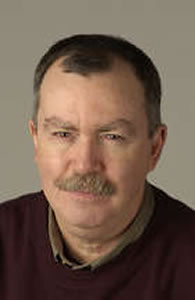
Charles Dickinson (Detroit, 4 juni 1951)
Zie voor de twee bovenstaande schrijvers ook mijn blog van 4 juni 2009.
Zie voor onderstaande schrijvers ook mijn blog van 4 juni 2009.
De Duitse schrijfster Dana Bönisch werd geboren op 4 juni 1982 in Frechen. Zie ook mijn blog van 4 juni 2007.
De Oostenrijkse schrijver Fritz Weber werd geboren op 4 juni 1895 in Wenen.
Allen Ginsberg, Philippe Djian, Monika Maron, Larry McMurtry, Norbert Gstrein, Gerhard Zwerenz, Kathleen E. Woodiwiss
De Amerikaanse dichter Irwin Allen Ginsberg werd geboren in Newark, New Jersey, op 3 juni 1926. Zie ook mijn blog van 3 juni 2006 en ook mijn blog van 3 juni 2007 en ook mijn blog van 3 juni 2008 en ook mijn blog van 3 juni 2009.
Cezanne’s Ports
In the foreground we see time and life
swept in a race
toward the left hand side of the picture
where shore meets shore.
But that meeting place
isn’t represented;
it doesn’t occur on the canvas.
For the other side of the bay
is Heaven and Eternity,
with a bleak white haze over its mountains.
And the immense water of L’Estaque is a go-between
for minute rowboats.
An Asphodel
O dear sweet rosy
unattainable desire
…how sad, no way
to change the mad
cultivated asphodel, the
visible reality…
and skin’s appalling
petals–how inspired
to be so Iying in the living
room drunk naked
and dreaming, in the absence
of electricity…
over and over eating the low root
of the asphodel,
gray fate…
rolling in generation
on the flowery couch
as on a bank in Arden–
my only rose tonite’s the treat
of my own nudity.
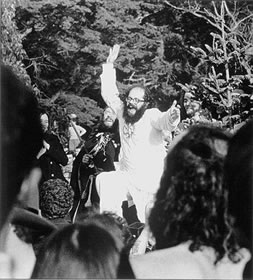
Allen Ginsberg (3 juni 1926 – 6 april 1997)
De Franse schrijver Philippe Djian werd geboren in Parijs op 3 juni 1949.
Uit: Criminels
“A vrai dire, je n’imaginais pas qu’elle reviendrait avec de bonnes nouvelles. Et j’avais raison.
Il m’est apparu, avec l’âge, comme une impérieuse nécessité de vivre avec une femme. Je ne reviens pas là-dessus.
Nous sommes dans une passe difficile. Tout semble aller de travers. Je ne sais pas où ça va nous mener. Tout ce que nous touchons s’enflamme sous nos doigts.
Je n’arrive pas à savoir si ce que je lui dis a le moindre effet sur lui. Il est comme sa mère. J’ai vécu dix ans de ma vie aux cotés d’une femme que je n’ai jamais pu approcher. D’autres s’en sont chargés à ma place.
Tu fais partie de ces gens qui s’imaginent que c’est un grand bonheur d’avoir des enfants. Je vais te dire une chose : ça marche pas à tous les coups. C’est même rare que ça arrive.
Est-ce qu’on en fait trop lorsqu’on est sincère ? Est-ce que vous voulez voir une belle façade ou ce qu’il y a à l’intérieur?…
Une fente s’est ouverte au milieu du ciel sombre, remplie de matière lumineuse, translucide et molle comme de la pâte de fruits.
Et puis, nous sommes arrivés à un âge où, même si l’on a évité les gros pépins, les petits ennuis commencent. Si je me passais en revue du sommet du crâne jusqu’à la pointe des pieds, j’aurais plus d’un motif de râler.
C’est la vérité. C’est comme ça. Une femme est toujours en train de penser à des trucs. Je veux dire des trucs auxquels on penserait pas…
Tu en connais beaucoup qui peuvent se payer le luxe de faire les difficiles ? Je veux dire, aujourd’hui, dans le monde où on vit. Tu lis pas les journaux ou quoi ? Tu crois qu’on peut se permettre d’avoir des sentiments ?
Faut pas se relever quand t’entends siffler le sabre.
J’y suis peut-être allé un peu fort. Et la vieillesse, c’est quand on a le sentiment qu’on n’aura plus le temps de réparer les choses. Quand on sait qu’on fait des trucs une bonne fois pour toutes.”
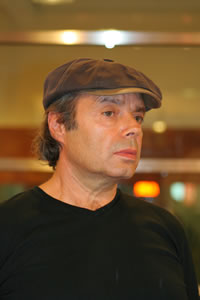
Philippe Djian (Parijs, 3 juni 1949)
De Duitse schrijfster Monika Maron werd geboren op 3 juni 1941 in Berlijn.
Uit: Bitterfelder Bogen
„Schon an der Autobahnausfahrt nach Bitterfeld-Wolfen wird der Unkundige eingewiesen: ein schwarzer Pfeil auf weißem Grund und der verheißungsvolle, auf eine wundersame Erfolgsgeschichte verweisende Name: Solar Valley. Kurz darauf, neben der Landstraße, ein weites Feld mit leuchtend blauen Solar – modulen, wie dem Acker entwachsen, auf dem sie in dichten Reihen stehen. Die Wegweiser am Kreisverkehr zeigen nach Bitterfeld und Wolfen, nach Greppin, Thalheim und noch einmal zum Solar Valley.
Fährt man in Richtung Thalheim, kreuzt man die Guardianstraße, wo ein sechsstöckiges Haus, in dessen aus Solarzellen gestalteter Fassade ein großes Q eingelassen ist, vom Ursprung des Solar Valley kündet: Q wie Q-Cells. In der Guardianstraße stehen die ersten Q-Cells-Gebäude, errichtet 2001, als niemand damit rechnete, dass man schon bald mehr Platz, viel mehr Platz brauchen würde, als auf diesem bemessenen Terrain zu haben war. Das eigentliche Solar Valley, ein inzwischen dreihundert Hektar großes Areal, an dessen Rändern Bagger und Kräne schon das nächste Bauland bereiten, liegt an der Sonnenallee, ein oder zwei Kilometer von der Guardianstraße entfernt.
Bei meinem ersten Besuch aber ließ ich Guardianstraße und Sonnenallee links liegen und fuhr geradeaus nach Bitterfeld. Ich hatte ein Bild im Kopf, ein schwarzes, verrußtes, rostfarbenes, dreißig Jahre altes Bild.“
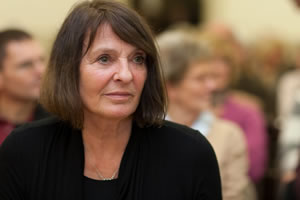
Monika Maron (Berlijn, 3 juni 1941)
Zie voor de twee bovenstaande schrijvers ook mijn blog van 3 juni 2007 en ook mijn blog van 3 juni 2008 en ook mijn blog van 3 juni 2009.
De Amerikaanse schrijver Larry Jeff McMurtry werd geboren op 3 juni 1936 in Wichita Falls, Texas. Zie ook mijn blog van 3 juni 2009.
Uit: Lonesome Dove: A Novel
“When Augustus came out on the porch the blue pigs were eating a rattlesnake — not a very big one. It had probably just been crawling around looking for shade when it ran into the pigs. They were having a fine tug-of-war with it, and its rattling days were over. The sow had it by the neck, and the shoat had the tail.
“You pigs git,” Augustus said, kicking the shoat. “Head on down to the creek if you want to eat that snake.” It was the porch he begrudged them, not the snake. Pigs on the porch just made things hotter, and things were already hot enough. He stepped down into the dusty yard and walked around to the springhouse to get his jug. The sun was still high, sulled in the sky like a mule, but Augustus had a keen eye for sun, and to his eye the long light from the west had taken on an encouraging slant.
Evening took a long time getting to Lonesome Dove, but when it came it was a comfort. For most of the hours of the day — and most of the months of the year — the sun had the town trapped deep in dust, far out in the chaparral flats, a heaven for snakes and horned toads, roadrunners and stinging lizards, but a hell for pigs and Tennesseans. There was not even a respectable shade tree within twenty or thirty miles; in fact, the actual location of the nearest decent shade was a matter of vigorous debate in the offices — if you wanted to call a roofless barn and a couple of patched-up corrals offices — of the Hat Creek Cattle Company, half of which Augustus owned.
His stubborn partner, Captain W. F. Call, maintained that there was excellent shade as close as Pickles Gap, only twelve miles away, but Augustus wouldn”t allow it. Pickles Gap was if anything a more worthless community than Lonesome Dove. It had only sprung up because a fool from north Georgia named Wesley Pickles had gotten himself and his family lost in the mesquites for about ten days.“
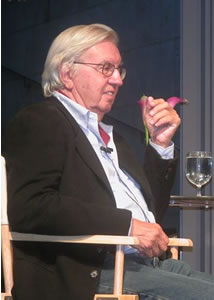
Larry McMurtry (Wichita Falls, 3 juni 1936)
De Oostenrijkse schrijver Norbert Gstrein werd geboren op 3 juni 1961 in Mils bei Imst, Tirol.
Uit: Das Sheerness des Erzählens
“Der “Genosse Schriftsteller” fragt auch in eigener Sache. Denn der Hintergrund ist der Einmarsch sowjetischer Truppen in die Tschechoslowakei genau zwei Tage vor dem genannten Datum, und es geht ihm ohne Zweifel nicht nur um die Reaktion Titos darauf, der sich mit der tschechischen Seite solidarisch erklärt hatte und nicht viel mehr als eine Woche davor noch in Prag gewesen war, sondern um seinen eigenen im vierten Teil ins Stocken geratenen Roman Jahrestage, der mit diesem Tag, dem 20. August 1968 enden sollte. Daher schreibt er auch davon, “mit dem Zeremoniell der Partei Sachen besprochen zu haben, die die Partei vorläufig anders besprochen haben möchte”, und obwohl seine Frau und er “ganz benommen von dem Erlebnis” waren, als sie ins Hotel eilten, ist es doch Erleichterung unter der plötzlich aufkommenden Angst, der Staatsmacht, deren Kontrolle er sich 1959 mit seinem Umzug in den Westen entzogen hatte, doch nicht ein für alle Mal entwischt zu sein. “Gewiss ist das Träume entfernt von ostberliner Verhältnissen, im Vergleich geradezu vorzüglich”, beruhigt er sich, “aber uns grauste doch bei der Vorstellung, von solchen Leuten einmal im Unguten verhört zu werden.”

Norbert Gstrein (Mils bei Imst, 3 juni 1961)
De Duitse schrijver en essayist Gerhard Zwerenz werd geboren op 3 juni 1925 in Crimmitschau in Saksen.
Uit: Van der Lubbe und die Folgen
“Thomas Mann schrieb bereits anno 1933 in einem Brief über den Leipziger Prozess: „Welch ein Morast, welch ein Menetekel.“ Wer dieses Menetekel durch Namenswechsel vergessen macht, verfälscht Geschichte. Das Reichsgericht nenne ich Marinus-Haus, den Häuserblock zwischen Pleiße und Peterssteinweg das Bloch-Quadrat, auch wenn historische Blindgänger noch hundert Jahre brauchen, dieser Einordnung zuzustimmen. Meine Gänge in Leipzig um Dimitroffplatz, Reichsgericht und Bloch-Quadrat wurden mir zur ständigen Begegnung mit unserer Vergangenheit, der wir per Erziehungsdiktatur zu entrinnen suchten. Sie betraf weniger das Volk als seine Intelligentsia. So mein ganz individueller Zustand anno 1953 und 1956, als sich mit Stalins Tod und Chruschtschows zorniger Rede ein kultureller Ausweg anbot. Leider wachsen immer mehr Dumme nach als von denen, die schon in Amtsstuben hocken, klug werden.
Der fatale Leipziger Rückzug vom 1933er Menetekel, die konsequente Vergessens-Strategie und damit verbundene Diffamierung von Rebellen und Widerständlern wurde vom Westen lange vorher betrieben und eskaliert eben in einem eklatanten Fall. So erhielt den diesjährigen Büchner-Preis ein Schriftsteller, der sich ohne die geringste Verrenkung gegen die Große Französische Revolution armiert und den Revolutionär Georg Büchner über den Jakobiner Saint Just mit Himmlers Massenmord-Reden koppelt. Da muss selbst eine FAZ, die den mit Fug und Recht als Anti-Büchnerpreisträger einzuordnenden Mosebach zuvor rückhaltlos hofierte, am Tag danach (1.11.07) zähneknirschend melden, sogar der brave Sozialdemokrat und Historiker Heinrich August Winkler nenne diesen Vorgang schlichtweg reaktionär. Kein Wunder, wenn die Wachhunde des Geschichtsrevisionismus an ihren Ketten zerren, dass es bundesweit rasselt. Darmstadt sollte eine Straße nach Martin Mosebach benennen, am besten eine kleine Sackgasse, denn kurz ist der Weg von der Bücher- zur Büchnerverbrennung.“

Gerhard Zwerenz (Crimmitschau, 3 juni 1925)
Zie voor de twee bovenstaande schrijvers ook mijn blog van 3 juni 2007 en ook mijn blog van 3 juni 2008 en ook mijn blog van 3 juni 2009.
De Amerikaanse schrijfster Kathleen E. Woodiwiss werd geboren op 3 juni 1939 in Alexandria, Louisiana. Zie ook mijn blog van 3 juni 2009.
Uit: Everlasting
“August 24, 1135
She knew his name was Raven Seabern, that he was here at Westminster Castle in the service of his king, and she was aware of something else as well, that the tall, raven-haired Scotsman was staring at her again. But she was the Lady Abrielle of Harrington, daughter of a late Saxon hero of the Crusades, stepdaughter of a Norman knight who had also gained high esteem for his brave years of service in the Holy Land, both to be honored here tonight, and she would give the man’s attention the lack of regard it deserved. For here, at the court of King Henry, she was being paid the admiration of so many men. She turned away quickly and nodded to her mother’s soft-spoken praise of the interior grandeur of the great hall of Westminster Castle. Two massive hearths dominated the room at each end, with flames roaring higher than a man. Tapestries kept out the chill drafts and depicted scenes of men in battle or men at the hunt. The stitches were colored in royal crimson and gold, the deepest blue of a king’s robe, the startling green of dark forest. Never had Abrielle been in a castle so magnificent in its display of wealth and power. And she had been invited by the king himself.
She wanted to savor this happy occasion, as nights such as this had become sadly rare in her life since her father’s death and her stepfather’s recent difficulties. It was hard to be at ease, however, much less concentrate, with the Scotsman’s vivid blue gaze following her with an intensity to which she was not accustomed.“

Kathleen E. Woodiwiss (3 juni 1939 – 6 juli 2007)
Zie voor nog meer schrijvers van de 3e juni ook mijn vorige blog van vandaag.
Pedro Mir, Detlev von Liliencron, Friederike Brun, Eugène Van Oye, Carlo Michelstaedter, Otto Erich Hartleben, Philippe Quinault
De Domicaanse dichter en schrijver Pedro Mir werd op 3 juni 1913 in San Pedro de Macorís geboren. Zie ook mijn blog van 3 juni 2009.
Uit: Countersong to Walt Whitman (Vertaald door Jonathan Cohen)
9
For
what has a great undeniable poet been
but a crystal-clear pool
where a people discover their perfect
likeness?
What has he been
but a deep garden
where all men recognize themselves
through language?
And what
but the chord of a boundless guitar
where the fingers of the people play
their simple, their own, their strong and
true, innumerable song?
For that’s why you, numerous Walt Whitman, who saw and ranted
just the right word for singing your people,
who in the middle of the night said
I
and the fisherman understood himself in his slicker
and the hunter heard himself in the midst of his gunshot
and the woodcutter recognized himself in his axe
and the farmer in his freshly sown field and the gold
panner in his yellow reflection on the water
and the maiden in her future town
growing and maturing
under her skirt
and the prostitute in her fountain of gaiety
and the miner of darkness in his steps beneath his homeland . . .
When the tall preacher, bowing his head
between his two long hands, said
I
and found himself united with the foundryman and the salesman
with the obscure traveler in a soft cloud of dust
with the dreamer and the climber,
with the earthy mason resembling a stone slab,
with the farmer and the weaver,
with the sailor in white resembling a handkerchief . . .
And all the people saw themselves
when they heard the word
I
and all the people heard themselves in your song
when they heard the word
I, Walt Whitman, a kosmos,
of Manhattan the son . . . !
Because you were the people, you were I,
and I was Democracy, the people’s family name,
and I was also Walt Whitman, a kosmos,
of Manhattan the son . . . !

Pedro Mir (3 juni 1913 – 11 juli 2000)
De Duitse dichter Detlev von Liliencron werd op 3 juni 1875 in Kiel geboren. Zie ook mijn blog van 3 juni 2007 en ook mijn blog van 3 juni 2008 en ook mijn blog van 3 juni 2009.
Italienische Nacht
I
Weit fort, im südlichen Italien war es. –
Du schautest vom Altane in den Garten
Auf weiterhellte, festbelebte Wege.
Dann hob dein Auge sich, und deine Seele
Verlor sich in das Schweigen ferner Landschaft:
Im Meer des Mondenlichtes liegen still
Die weißen Schlösser, Schiffen gleich, vor Anker.
Es dunkeln, Inseln, die Zypressenhaine,
Wo Liebesworte und Gitarrenklang
Im gleichen Fall der Brunnen sich vermischen.
Wie lange willst du träumen, deutsche Frau,
Von glutdurchtränkter Nacht des Romeo?
Weckt dir Erinnerung nicht liebe Bilder
Aus unbarmherzig strenger Winternacht,
Die mit gesenktem Augenlid umdämmert
Die Hünengräber deines rauhen Strandes?
II
Im Nebelnorden, an der Ostseeküste,
Abseits der Städte und der großen Straßen,
Schläft einsam und vergessen, halb verweht
Im Schnee, von harten Stürmen oft gezaust,
Ein kleines Gut. Zwei ungeschlachte Riesen,
Uralte Tannen, strecken ihre Arme
Wie Speere vor zum Schutz des Herrenhauses.
Unhörbar, drinnen auf dem Smyrnateppich,
Geht eine junge Dame auf und nieder.
Bisweilen bleibt sie stehn, schraubt an der Lampe,
Schiebt auf dem Bechstein an das Notenpult
Die schweren Bronzekandelaber näher,
Zupft im Vorübergehen an der Decke
Des Sofatisches, horcht, und wandert, horcht,
Die grauen Augen auf die Tür gerichtet.
Bis endlich ihre schwere Stirn ein Schwarm
Von Sommervögeln lustig überflattert.
Nun schreitet langsam auf dem warmen Teppich
Ein Pärchen, angeschmiedet, auf und nieder.
Behaglichkeit, das Kätzchen, schnurrt im Zimmer,
Indessen draußen in der Winternacht,
Ein Abglanz von den Schilden Schlachterschlagner,
Die fleißig in Walhall den Humpen schwingen,
Die blassen Strahlenbündel eines Nordlichts
Am strengen Himmel Odins sich ergießen.
Und auf der toten Heide bellt der Fuchs.

Detlev von Liliencron (3 juni 1875 – 22 juli 1909)
Portret door Arthur Illies, 1913
De Deense dichteres Friederike Brun werd geboren op 3 juni 1765 in Gräfentonna, Thüringen. Zie ook mijn blog van 3 juni 2007 en ook mijn blog van 3 juni 2009.
Zuruf an die Gegend von Rom
Sey mit stürzenden Thränen der Freude gegrüßt,
Was auch fern vor der Seele mir stand,
Wo sich kühner der Keim der Gedanken erschließt,
O du altes Saturnisches Land,
Wo die heilige Höh’ und die wallende Fluth
Mir entzünden und kühlen die sehnende Gluth,
Die nach dir ich im Busen empfand.
Wem im Busen das Herz, in dem Herzen der Geist
Sich erhebet zum höheren Seyn;
Wem sich tiefer der Quell der Gedanken ergeußt,
O wie fröhlich kann der hier gedeih’n!
Stürzt die WeIt auch in stäubende Trümmer dahin,
Im Unendlichen schwebet der geistige Sinn,
Und verschmäht den betrüglichen Schein!
Was da war, was noch ist, und was werden einst kann.
Das erscheinet dem sinnenden Blick!
Wenn sich löset der vielfach umkreisende Bann,
Und einst Nemesis kehret zurück!
Mit der Rechten schwingt sie die Geißel empor,
Treibt aus finsterer Nacht die Verbrecher hervor,
Und befreit das gefesselte Glück!

Friederike Brun (3 juni 1765 – 25 maart 1835)
De Vlaamse arts, dichter en toneelschrijver Eugène Van Oye werd geboren in Torhout op 3 juni 1840. Zie ook mijn blog van 1 mei 2007 en ook mijn blog van 3 juni 2007 en ook mijn blog van 3 juni 2009.
Vriendenzoen
(Voor Eugène van Oye)
Waar zaat gij dan
gestoken, gij,
verduisterd en
verdoken, gij,
o vriendenhert:
dor vriendenhand,
zoo waandet ge, in
uw onverstand,
gekwetst en afgewezen?
‘k En hadde u nooit
vergeten, ik,
geen weêrstand u
verweten, ik;
geen stroo u in
den weg geleid,
geen werk gedaan,
geen woord gezeid,
dat kwetsende u kon wezen.
Nog meer als ik,
zijt gij, misschien,
een vriendenherte
en mij, misschien,
spijts al hetgeen,
tot beider leed,
ons beider liefde
in stukken smeet,
een ware vriend gebleven?
Dat vriendschap is
moet sterker zijn,
moet, sterk alzoo
de kerken, zijn
gesteund op vast-
en dieper grond
als vriendenhand
en vriendenmond,
zoo nu, zoo na dit leven.
‘t Is dit alleen,
dat scheiden ons
zoo bitterlijk,
dat beiden ons
kon drijven, om,
gij hier, ik daar,
verre af en zoo
nabij malkaar,
te porren en te pogen
aan ‘t gene ik wist,
of waande, dat
het was; en gij
hieldt staande dat
het niet en was:
niet anders als
een ijdel woord,
een vuil en valsch,
eene opgesmukte logen.
Zoo ziet men ‘t gene,
op dezen dag,
nog ijzervast
gevezen lag,
verworteld en
verwassen, eer
‘t ooit morgen is,
met éénen keer,
ter stede, in stukken vliegen;
zoo komt men eere
en trouw vaneen,
zoo komt men man
en vrouw vaneen,
zoo vriendenherte
en vriendenhand,
zoo onderdaan
en vaderland
en volk intween te liegen.
‘k Herbiede u dan
de vriendenhand,
het vriendenhert,
den vriendenband,
die, spannende en
weêrspannig aan
ons beider bede,
is losgegaan,
nu weêr aaneen te binden.
‘k Herbiede u hulpe
en bijstand, in
den strijde, om weêr
den vijand in
te stormen; en
dat ongekleed,
dat edel wicht,
dat Waarheid heet,
te zoeken en te vinden.
Guido Gezelle

Eugène Van Oye (3 juni 1840 – 4 juni 1926)
Standbeeld in Gistel
De Italiaanse dichter, filosoof en schilder Carlo Michelstaedter werd geboren op 3 juni 1887 in Gorizia. Zie ook mijn blog van 3 juni 2009.
Uit: Persuasion and Rhetoric (Vertaald dsoor Russell Scott Valentino)
„Nor is any life ever satisfied to live in any present, for insofar as it is life it continues, and it continues into the future to the degree that it lacks life. If it were to possess itself completely here and now and be in want of nothing-if it awaited nothing in the future-it would not continue: it would cease to be life.
So many things attract us in the future, but in vain do we want to possess them in the present.
I climb to a mountaintop: its height calls me, I want to have it, and I ascend and dominate it. But how can I possess the mountain? I am truly high above the plain and sea, and I see the wide horizon from the mountain. But none of that is mine: What I see is not within me, nor does seeing more ever mean, “I have seen”: the sight, I don’t possess it. The sea shines bright in the distance-that will be mine in a different manner. I shall descend to the coast. I’ll hear its voice, sail along its back and … be content. But now on the sea, “the ear cannot be filled with hearing,” the boat rides ever new waves, and “an equal thirst takes hold of me.” I may plunge into it, feel a wave across my body, but where I am the sea is not. If I want to go where the water is and have it, the waves make way before the swimming man. I may drink in the saltiness, exult like a porpoise, drown myself, but I still won’t possess the sea: I am alone and distinct in its midst.
Nor can a man seeking refuge in the persona he loves satisfy his hunger: neither kisses nor embraces nor any other demonstrations invented by love can interpenetrate one with the other: they will always be two, each alone and distinct. Men lament this solitude, but if they find it lamentable it is because being with themselves they feel alone: they feel themselves to be with no one, in want of everything.“

Carlo Michelstaedter (3 juni 1887 – 17 oktober 1910)
De Duitse dichter en schrijver Otto Erich Hartleben werd geboren op 3 juni 1864 in Clausthal. Zie ook mijn blog van 3 juni 2009.
Der Sünder
Wenn ich den Wellenschlag des Meeres höre,
eintönig rauschend, Nachts, in dunkler Stunde,
aufblutet des Gewissens alte Wunde,
so stark ich auch mich wider mich empöre.
Ich seh ein Weib, gehüllt in Trauerflöre,
das murmelt dumpf mit todesblassem Munde,
was mich vor Graun erbeben macht, die Kunde,
dass sie der Schande Fluch im Grabe störe.
Weh meinem fiebergluth-durchlohten Hirne!
Ich seh sie winken mir mit schmalen Händen –
und kalte Tropfen perlen von der Stirne.
Der Rache Faust seh ich auf mich sie wenden,
weil sie durch mich erniedrigt ward zur Dirne –
in Qualen fühl ich meine Nächte enden.
Wir hattens einst so gut verstanden
Wir hattens einst so gut verstanden,
zu küssen uns zu rechter Stund,
eh wir es selber ganz empfanden,
gefunden hatte Mund den Mund.
Ein einiger Gedanke schwebte,
war weder mir noch dir bewusst,
und plötzlich Lipp an Lippe bebte
und plötzlich bebte Brust an Brust.
Dann haben wirs vergessen müssen,
verleugnet ward die Kinderzeit,
wir trugen, statt uns froh zu küssen,
ehrbar und dumm das Heuchlerkleid.
Doch als ich heut nach langen Tagen,
dich still geliebte wiedersah –
wir hattens gar zu schwer getragen –
war Kuss und Kindheit wieder da!

Otto Erich Hartleben (3 juni 1864 – 11 februari 1905)
De Franse dichter, schrijver en librettist Philippe Quinault werd geboren in Parijs op 3 juni 1635. Zie ook mijn blog van 3 juni 2009.
Poème sur l’hérésie (Fragment)
TABLEAU DE LA CHUTE DE L’HÉRÉSIE
Je n’ai que trop chanté les jeux et les Amours.
Sur un ton plus sublime il faut me faire entendre ;
Je vous dis adieu, Muse tendre,
Je vous dis adieu pour toujours.
C’est à des actions d’éternelle mémoire
Que je dois consacrer mes vers,
Je ne veux désormais célébrer que la gloire
Du plus grand Roy de l’Univers.
Quelle multitude innombrable
D’héroïques vertus et d’étonnants exploits !
Est-ce la valeur indomptable
Ou la sagesse impénétrable
Pour qui je dois d’abord faire éclater ma Voix ?
Chanterai-je la guerre où ce Roy redoutable
De tant de Rois ligués a triomphé cent fois ?
Chanterai-je la paix encore plus mémorable
Dont en Maistre du Monde il imposa les loix ?
Mais un nouveau triomphe à qui tout autre cède
M’engage à l’annoncer sur les tons les plus forts :
Loin de moy, profanes transports,
Un transport divin me possède.
Avec étonnement j’observe un si grand Roy,
J’ay peine à soutenir tout l’éclat de sa gloire
Pour exprimer ce que je voy !
L’avenir pourra-t-il m’en croire ?

Philippe Quinault (3 juni 1635 – 26 november 1688)
Standbeeld in de gevel van het l’Hôtel de ville in Parijs
90 Jaar Marcel Reich-Ranicki, Jim Knipfel, Sibylle Berg, Carol Shields, Max Aub
De Duitse schrijver en liteatuurcriticus Marcel Reich-Ranicki werd geboren op 2 juni 1920 in Włocławek, Polen. Reich-Ranicki viert vandaag zijn 90e verjaardag. Zie ook mijn blog van 2 juni 2009.
Uit: Für alle Fragen offen
„Was halten Sie von Gustave Flaubert und Madame Bovary?
Gustave Flaubert war beides – ein Poet und ein Protokollant, ein Romantiker und ein Realist, ein Visionär und ein Berichterstatter, stets leidenschaftlich und pedantisch zugleich. Er war Frankreichs sachlichster Dichter und zärtlichster Chronist, wahrscheinlich der neben den Russen Tolstoi und Dostojewski größte Prosaschriftsteller des neunzehnten Jahrhunderts. Sein Hauptwerk, der Roman Madame Bovary, hat längst die Grenzen gesprengt: Er wurde in alle Sprachen der zivilisierten Welt übersetzt, man hat ihn mehrfach verfilmt und auch vertont und für die Bühne bearbeitet. Und natürlich wurde er zahllose Male kommentiert.
Woran geht eigentlich Emma Bovary, deren Geschichte Flaubert erzählt, zugrunde? An der unglücklichen Ehe mit einem biederen und langweiligen Landarzt? An ihrer bornierten, kleinbürgerlichen Umgebung? An der Monotonie des Alltags in einem französischen Provinznest? An dem Konflikt zwischen Traum und Leben, zwischen Phantasie und Realität, also an der Scheinwelt, in der sie Zuflucht sucht? Sind es die überspannten Wünsche und die romantischen Vorstellungen, die ihr zum Verhängnis werden? Oder scheitert sie an der Liebe, genauer: an der Sehnsucht nach Liebe?
So viele Fragen es auch sind, die der Roman aufwirft – die Zahl der Antworten ist ungleich größer. Denn jeder Leser versteht diese Geschichte auf seine Weise. Millionen haben sich in ihr wieder gefunden – vielleicht deshalb, weil wir hier von einem Menschen hören, dem kein Preis zu hoch war, um zu leben, statt zu vegetieren. Es gibt nicht viele Romane, von denen man sagen kann: Wer sie nicht gelesen hat, sollte wissen, dass er keine Ahnung hat, was die Weltliteratur leisten kann. Madame Bovary ist ein solcher Roman.“

De Amerikaanse schrijver Jim Knipfel werd geboren op 2 juni 1965 in Green Bay, Wisconsin. Zie ook mijn blog van 2 juni 2007 en ook mijn blog van 2 juni 2008 en ook mijn blog van 2 juni 2009.
Uit: Slackjaw: A Memoir
“”Suicide hotline?” the chipper young woman on the other end of the phone seemed to ask me when she answered.
When I dialed the phone, I had no idea what I was going to say. I hadn’t thought that far ahead. What: “I’m about to open my veins. Now what the hell are you going to do about it?” That wouldn’t do. I get into trouble when I don’t think about things beforehand. I’ve never been a good improviser. So instead of saying something moronic, I opted to say nothing at all.
“Hello?” the voice at the other end returned. “Anyone there?”
All the Nietzsche I had been immersed in went right out the window.
“Hello?” she asked again. “I can hear you breeaathing!”
“Shut up,” I snapped. I was tempted to say, “That’s it, you blew it,” and hang up, but I wasn’t that cruel, yet.
“So what’s going on?”
Oh, what do you think? That I just called to chat?
“I meant, what are you planning?” She meant business.
“Razors. I guess. At least that’s what I have in front of me.”
“Razors rarely work, you know.”
Terrific. I call for help, and I get someone who critiques my style.
“Got any better suggestions? I can’t afford a gun.”
“That’s not what I’m here for. I’m here to help.”
“Well, you’re doing a bang-up job of it.”
“Hey,” she said, “we got off on the wrong foot.” I could hear the exasperation in her voice. “Let’s start again. What’s your name?”
“Name doesn’t matter.”
“Okay,” she said. “Why don’t you tell me why you want to kill yourself?”
“A man has to have a reason? I didn’t break up with a girlfriend, I didn’t lose a job, and I wasn’t just told that I have Hodgkin’s disease. Nothing that simple.”
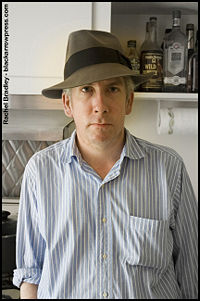
De Duitse schrijfster Sibylle Berg werd geboren in Weimar op 2 juni 1962. Zie ook mijn blog van 2 juni 2007 en ook mijn blog van 2 juni 2008 en ook mijn blog van 2 juni 2009.
Uit: Der Mann schläft
“Damals.
Im Winter. Vor vier Monaten.
Draußen war ein Winter gewesen, der den Bildern, die wir früher vom Winter gehabt haben, nicht einmal entfernt glich. Saubere, tiefgekühlte Dezember mit Reif und kleinen Häusern, in denen gepflegte Familien vor Bratäpfeln saßen, gab es schon lange nicht mehr. Kein Schnee verdeckte die Unattraktivität der Welt, nur dunkelgrau war sie, klamm und verwaschen. Während drei langer Monate würde das Licht sich kaum verändern; dem Winter würde ein verregneter Frühling folgen, der in einen trüben Sommer überging.
Nebel lag auf der Stadt, die noch nicht einmal eine Stadt war, und der Mensch hielt Winterschlaf. Die es sich leisten konnten, verließen ihre Häuser nicht, sie schlurften in Pyjamas herum, Speisereste im Haar, leere Pizzaschachteln unter dem Bett, und Spinnen mit neurotischen Gesichtern spannen ihre Netze zwischen den Läufen der Personen. Die wenigen, die man auf öffentlichem Gelände sah, waren kaum dazu geeignet, einen mit kleinen, fröhlichen Sprüngen das Leben feiern zu lassen.
Ich war auf der Straße gewesen, hatte in hoffnungslose Gesichter gesehen und mich einen Moment lang gefühlt, als sei ich wieder eine von ihnen, die doch so warteten, dass etwas eintreten werde, durch das sie sich endlich wieder lebendig fühlten. Ich hatte mich an jenem Morgen so stark an das Gefühl erinnert, bei aberwitzigem Wetter alleine zu sein, dass mir übel geworden war, für Sekunden, in denen ich aus der Wirklichkeit gefallen war. Ich hatte eine Zeitung kaufen wollen, und als ich, die Augen vor dem Elend halbverschlossen, das einzige im Winter geöffnete Café passierte, vermeinte ich darin Gespenster aus der Vergangenheit wahrzunehmen. Eine füllige Frau mit Armprothese saß neben einem Mann, an den ich mich nur erinnerte, weil er so übertrieben unscheinbar wirkte wie eine Karikatur.“
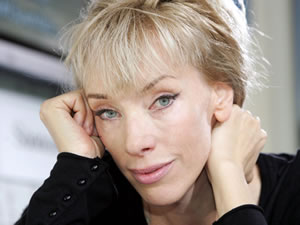
De Canadese schrijfster Carol Shields werd op 2 juni 1935 in Oak Park, Chicago, geboren als Carol Warner. Zie ook mijn blog van 2 juni 2009.
Uit: Small Ceremonies
„September
Sunday night. And the thought strikes me that I ought to be happier than I am.
We have high tea on Sunday, very Englishy, the four of us gathered in the dining ell of our cream-coloured living room at half-past five for cold pressed ham, a platter of tomatoes and sliced radishes. Slivers of hardboiled egg. A plate of pickles.
The salad vegetables vary with the season. In the summer they”re larger and more varied, cut into thick peasant slices and drenched with vinegar and oil. And in the winter, in the pale Ontario winter, they are thin, watery, and tasteless, though their exotic pallor gives them a patrician presence. Now, since it is September, we are eating tomatoes from our own suburban garden, brilliant red under a scatter of parsley. Delicious, we all agree.
“Don”t we have any mustard?” my husband Martin asks. He is an affectionate a
nd forgetful man, and on weekends made awkward by leisure.
“We”re all out,” I tell him, “but there”s chutney. And a little of that green relish.”
“Never mind, Judith. It doesn”t matter.”
“I”ll get the chutney for you,” Meredith offers.
“No, really. It doesn”t matter.”
“Well, I”d like some,” Richard says.
“In that case you can just go and get it yourself,” Meredith tells him. She is sixteen; he is twelve. The bitterness between them is variable but always present.
Meredith makes a sweep for the basket in the middle of the table. “Oh,” she says happily, “fresh rolls.”
“I like garlic bread better,” Richard says. He is sour with love and cannot, will not, be civil.“
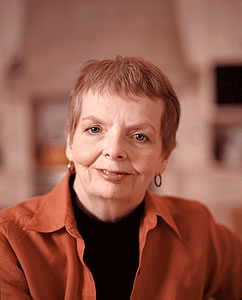
De Spaanse schrijver Max Aub werd geboren op 2 juni 1903 in Parijs. Zie ook mijn blog van 2 juni 2007 en ook mijn blog van 2 juni 2008 en ook mijn blog van 2 juni 2009.
Uit: Crimes exemplaires (Vertaald door Jean Paul Guibbert)
„Il ronflait. On pardonne au ronfleur s’il est de votre famille.
Celui-là je ne le connaissais même pas de vue. Ses ronflements traversaient les murs. Je suis allé chez le propriétaire : il s’est moqué de moi. Je suis allé voir l’auteur de bruits si monstrueux ; il m’a pratiquement mis à la porte :
– Ça n’est pas ma faute. Je ne ronfle pas. Et si c’est moi, que voulez-vous que j’y fasse ? J’ai le droit. Achetez-vous du coton hydrophile…
Je ne pouvais pas dormir : s’il ronflait, à cause du bruit ; et en l’attendant, s’il ne ronflait pas. Quand je donnais des coups sur la cloison il se taisait un moment… mais recommençait ensuite. Vous n’avez pas idée de ce que c’est que d’être une sentinelle du bruit. Une cataracte, un formidable volume d’air,
un fauve pris au piège, le râle de cent moribonds, me déchiraient les entrailles, empoisonnaient mes oreilles et je ne pouvais jamais dormir, jamais. Et je ne pouvais même pas changer de maison. Où aurais-je été, où payer aussi peu ? Le coup qu’il a pris, c’est avec la carabine de mon neveu.
Je ne puis supporter le contact du velours. J’ai une allergie au velours. En ce moment même ma peau se hérisse au seul fait d’en parler. J’ignore comment tout ceci est arrivé dans la conversation. Cet homme, si raffiné, ne croyait à rien d’autre qu’à la satisfaction de ses fantaisies. J’ignore d’où il a sorti un morceau de ce maudit velours qu’il a commencé à me promener sur les joues, sur la nuque et les narines ; mais c’es
t bien la dernière fois qu’il l’a fait.
J’avais raison ! Ma théorie était irréfutable. Et ce vieux gâteux niait tout avec son sourire imperturbable comme s’il était Cassandre et investi par charisme de sa divine infaillibilité. Mes arguments étaient absolument parfaits, indiscutables. Et cet imbécile décrépit à la barbe sale, édenté, couvert de tous ses doctorats honoris causa, les mettait en doute et s’obstinait dans des théories démodées qui n’étaient vivantes que dans son esprit ankylosé et ses livres que personne ne lit plus. Vieillard putréfié.“
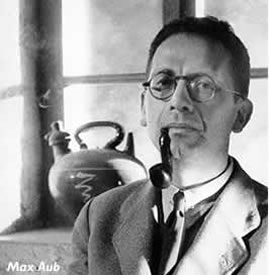
Zie voor nog meer schrijvers van de 2e juni ook mijn vorige blog van vandaag.
Thomas Hardy, Markies De Sade, Karl Gjellerup, Barbara Pym, Dorothy West
De Engels romanschrijver en dichter Thomas Hardy werd op 2 juni 1840 geboren in Higher Bockhampton, bij Dorchester. Zie ook mijn blog van 2 juni 2008 en ook mijn blog van 2 juni 2006 en ook mijn blog van 2 juni 2007 en ook mijn blog van 2 juni 2009.
Uit: Far from the Madding Crowd
„When Farmer Oak smiled, the corners of his mouth spread till they were within an unimportant distance of his ears, his eyes were reduced to chinks, and diverging wrinkles appeared round them, extending upon his countenance like the rays in a rudimentary sketch of the rising sun.
His Christian name was Gabriel,and on working days he was a young man of sound judgment, easy motions, proper dress, and general good character. On Sundays he was a man of misty views, rather given to postponing, and hampered by his best clothes and umbrella: upon the whole, one who felt himself to occupy morally that vast middle space of Laodicean neutrality which lay between the Communion people of the parish and the drunken section,—that is, he went to church, but yawned privately by the time the congregation reached the Nicene creed, and thought of what there would be for dinner when he meant to be listening to the sermon. Or, to state his character as it stood in the scale of public opinion, when his friends and critics were in tantrums, he was considered rather a bad man; when they were pleased, he was rather a good man; when they were neither, he was a man whose moral colour was a kind of pepper-and-salt mixture.
Since he lived six times as many working-days as Sundays, Oak’s appearance in his old clothes was most peculiarly his own—the mental picture formed by his neighbours in imagining him being always dressed in that way. He wore a low-crowned felt hat, spread out at the base by tight jamming upon the head for security in high winds, and a coat like Dr. Johnson’s,4 his lower extremities being encased in ordinary leather leggings and boots emphatically large, affording to each foot a roomy apartment so constructed that any wearer might stand in a river all day long and know nothing of damp—their maker being a conscientious man who endeavoured to compensate for any weakness in his cut by unstinted dimension and solidity.
Mr. Oak carried about him, by way of watch, what may be called a small silver clock; in other words, it was a watch as to shape and intention, and a small clock as to size. This instrument being several years older than Oak’s grandfather, had the peculiarity of going either too fast or not at all. The smaller of its hands, too, occasionally slipped round on the pivot, and thus, though the minutes were told with precision, nobody could be quite certain of the hour they belonged to.“
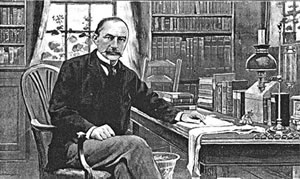
De Franse schrijver Donatien Alphonse François, Markies de Sade, werd geboren op 2 juni 1740 in Parijs. Zie ook mijn blog van 2 juni 2009. en ook mijn blog van 2 juni 2008. en ook mijn blog van 2 juni 2007 en ook mijn blog van 2 juni 2006.
Uit: Les infortunes de la vertu
„Mme la comtesse de Lorsange était une de ces prêtresses de Vénus, dont la fortune est l’ouvrage d’une figure enchanteresse, de beaucoup d’inconduite et de fourberie, et dont les titres quelque pompeux qu’ils soient ne se trouvent que dans les archives de Cythère, forgés par l’impertinence qui les prend et soutenus par la sotte crédulité qui les donne.
Brune, fort vive, une belle taille, des yeux noirs d’une expression prodigieuse, de l’esprit et surtout cette incrédulité de mode qui, prêtant un sel de plus aux passions, fait rechercher avec bien plus de soin la femme en qui l’on la soupçonne ; elle avait reçu néanmoins la plus brillante éducation possible ; fille d’un très gros commerçant de la rue Saint-Honoré, elle avait été élevée avec une soeur plus jeune qu’elle de trois ans dans un des meilleurs couvents de Paris, où jusqu’à l’âge de quinze ans, aucun conseil, aucun maître, aucun bon livre, aucun talent ne lui avait été refusé. A cette époque fatale pour la vertu d’une jeune fille, tout lui manqua dans un seul jour. Une banqueroute affreuse précipita son père dans une situation si cruelle que tout ce qu’il put faire pour échapper au sort le plus sinistre fut de passer promptement en Angleterre, laissant ses filles à sa femme qui mourut de chagrin huit jours après le départ de son mari. Un ou deux parents qui restaient au plus délibérèrent sur ce qu’ils feraient des filles, et leur part faite se montant à environ cent écus chacune, la résolution fut de leur ouvrir la porte, de leur donner ce qui leur revenait et de les rendre maîtresses de leurs actions. Mme de Lorsange qui se nommait alors Juliette et dont le caractère et l’esprit étaient à fort peu de chose près aussi formés qu’à l’âge de trente ans, époque où elle était lors de l’anecdote que nous racontons, ne parut sensible qu’au plaisir d’être libre, sans réfléchir un instant aux cruels revers qui brisaient ses chaînes. Pour Justine, sa soeur, venant d’atteindre sa douzième année, d’un caractère sombre et mélancolique, douée d’une tendresse, d’une sensibilité surprenantes, n’ayant au lieu de l’art et de la finesse de sa soeur, qu’une ingénuité, une candeur, une bonne foi qui devaient la faire tomber dans bien des pièges, elle sentit toute l’horreur de sa position.“

De acteur Geoffrey Rush als De Sade in de film Quills uit het jaar 2000
De Deense schrijver Karl Adolph Gjellerup werd geboren op 2 juni 1857 in Roholte. Zie ook mijn blog van 2 juni 2007 en en ook mijn blog van 2 juni 2009.
Uit: Der Pilger Kamanita
„Einst wanderte der Buddha im Lande Magadha von Ort zu Ort und kam nach Rajagaha. Der Tag ging schon zur Neige, als der Erhabene sich der Stadt der fünf Hügel näherte. Gleich dem Abglanz einer segnenden Götterhand breiteten sich die milden Strahlen der Sonne über die weite, mit grünen Reisfeldern und Wiesen bedeckte Ebene. Hier und dort zeigten kleine an der Erde hinkriechende Wölkchen, wie aus reinstem Goldstaube, daß Menschen und Ochsen von der Feldarbeit heimkehrten; und die langgestreckten Schatten der Baumgruppen waren wie von einer regenbogenfarbigen Glorie umgeben. Aus dem Kranze der blühenden Gärten glänzten die Torzinnen, Terrassen, Kuppeln und Türme der Hauptstadt hervor, und in unvergleichlichem Farbenschmelz, als wären sie aus Topasen, Amethysten und Opalen gebildet, lag die Reihe der Felsenhügel da.
Von diesem Anblick ergriffen, blieb der Erhabene stehen. Mit Freuden begrüsste er jene vertrauten Formen, die so manche Erinnerungen für ihn bargen: das graue Horn, das breite Joch, den Seherfelsen und den Geierkulm, “dessen schöner Gipfel die andern wie ein Dach überragt”;–vor allen aber Vibhara, den Berg der heissen Quellen, der mit seiner Höhle des Sattapannibaumes dem Heimatlosen eine erste Heimat bereitet hatte–die erste Rast auf dem letzten Wege vom Sansara ins Nirvana.
Denn als er damals “noch in frischer Blüte, mit glänzendem, dunklem Haar, im Genusse glücklicher Jugend, im ersten Mannesalter, gegen den Wunsch seiner weinenden und klagenden Eltern” das fürstliche Vaterhaus im nördlichen Lande der Sakyer verlassen und seine Schritte nach dem Gangatal gerichtet hatte, da gönnte er sich erst dort einen längeren Aufenthalt, indem er jeden Morgen um Almosenspeise nach Rajagaha ging.“
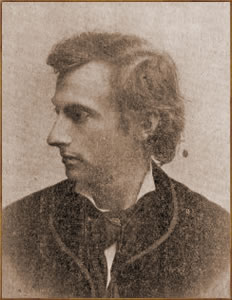
De Engelse schrijfster Barbara Pym werd geboren op 2 juni 1913 in Oswestry, Shropshire. Zie ook mijn blog van 2 juni 2007 en en ook mijn blog van 2 juni 2009.
Uit: Felicity and Barbara Pym (Biografie door Harrison Solow)
„However, I suspect you feel you would like to, and that is the basis of your irritation with silly men, mousy women, tea, religion, and quotations. Is this worthy of the august company of Dante, Proust, Dostoyevsky? It may interest you to know that Barbara Pym felt as you do, when she was about your age ― reading Aldous Huxley, and imagining herself in a more glittering, a more significant, world. And so to protect herself from an unbearable exclusion from that world, she wrote a novel, Young Men in Fancy Dress, in hope, her biographer says, of becoming part of it.
Her irritation with silly men was no different from yours, or mine, or anyone’s really, you see. The only difference is what each of us regards as ‘silly.’ Literature, or at least, books (I will not presume to add
Pym to the Masters, as you call them ― although surely there are degrees of literature) offer a way out ― out of a time, a space, a life, a status, a level of experience that is unsatisfactory to the reader. Not by virtue of escape, but by metamorphosis, via instruction. As you are being offered a way out of literary exile by the recommended guide ― books, maps, and in the end, one hopes, transportation to the inherited literary land of Barbara Pym. And although you may not now want to arrive in such a place, you have chosen it as your destination. But I suppose you must. After all, it does not make sense that you should have chosen to enter a fictional world you find irritating (though you may realise that it is possible to learn something from it). „

De Amerikaanse schrijfster Dorothy West werd geboren op 2 juni 1907 in Boston. Zie ook mijn blog van 2 juni 2007 en en ook mijn blog van 2 juni 2009.
Uit: Elizabeth Benedict “A Matter of Color” (Washington Post 8 Jan. 1995)
„After her return to the United States, West became the founding editor of The Challenge, a magazine devoted to publishing the best writing by African Americans. When the publication failed, West founded and edited The New Challenge, maintaining her commitment to publishing new writing by African Americans. Both publishing efforts suffered from financial trouble and were eventually abandoned. West ultimately left Harlem and moved to Martha’s Vineyard, where she lived until her death in 1998.
In much of West’s writing, “white racism finds echoes in black society’s obsession of gradations of skin color and the possibility of ‘passing.’”1 Her 1948 semi-autobiographical novel, The Living Is Easy, explores racism and class-consciousness among the African-American bourgeoisie in Boston. Though some critics have argued that West ignores many problems African Americans face as a result of racism, some suggest that she incorporates an element of social commentary in the book through her criticism of the values and ethics of the African-American middle class. A second novel, The Wedding, was started in the 1960s but West didn’t complete it until the 1990s. Her editor for this book, her Martha’s Vineyard neighbor Jacqueline Kennedy Onassis, read West’s work in the island’s local paper and encouraged her to complete the novel. Similar to her earlier novel and to many of her short stories, The Wedding examines issues of race and class among upper-middle class African Americans, this time in the Martha’s Vineyard community, Oak Bluffs. After its publication, the novel was adapted for television by Oprah Winfrey; it starred Halle Berry.“

